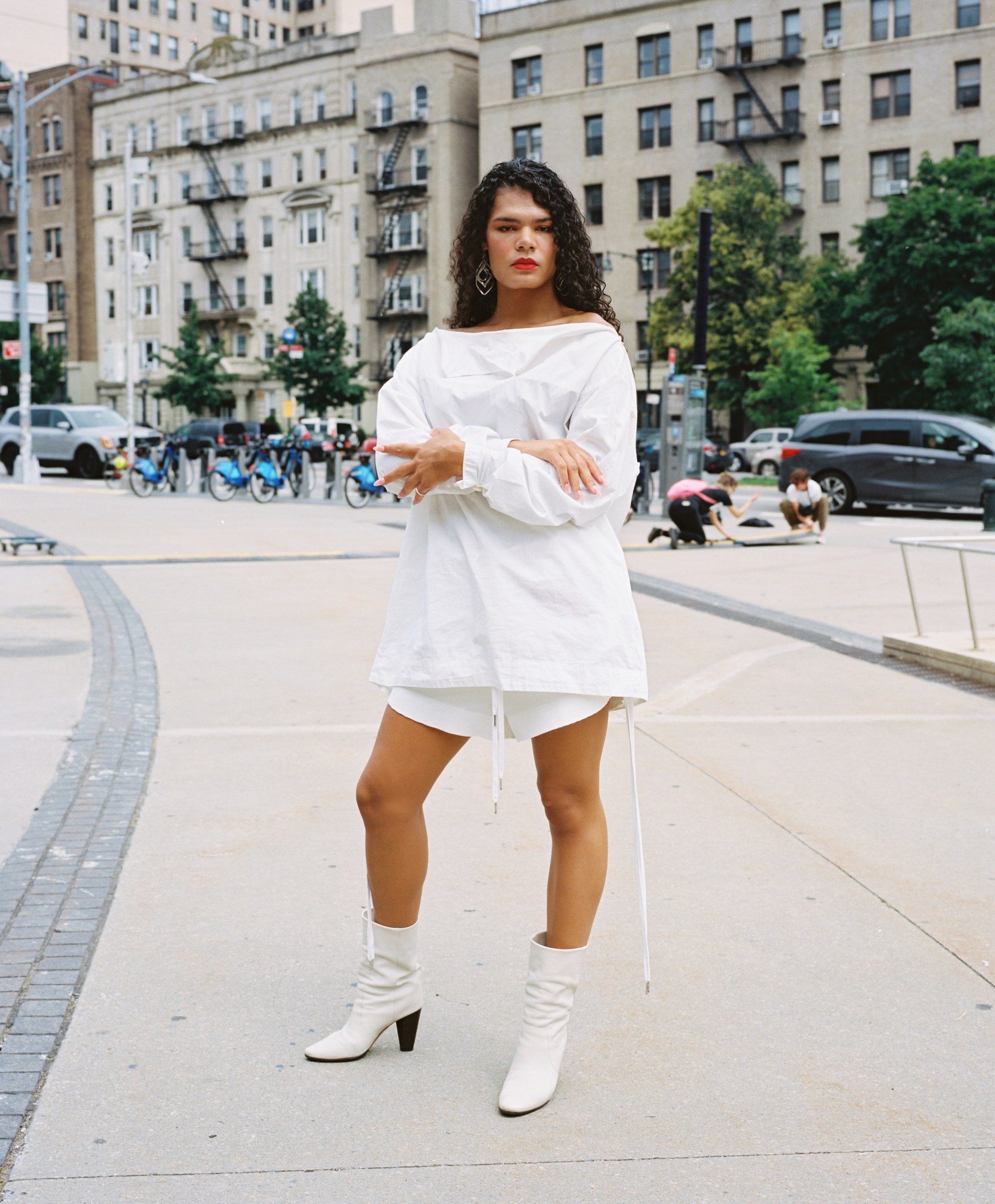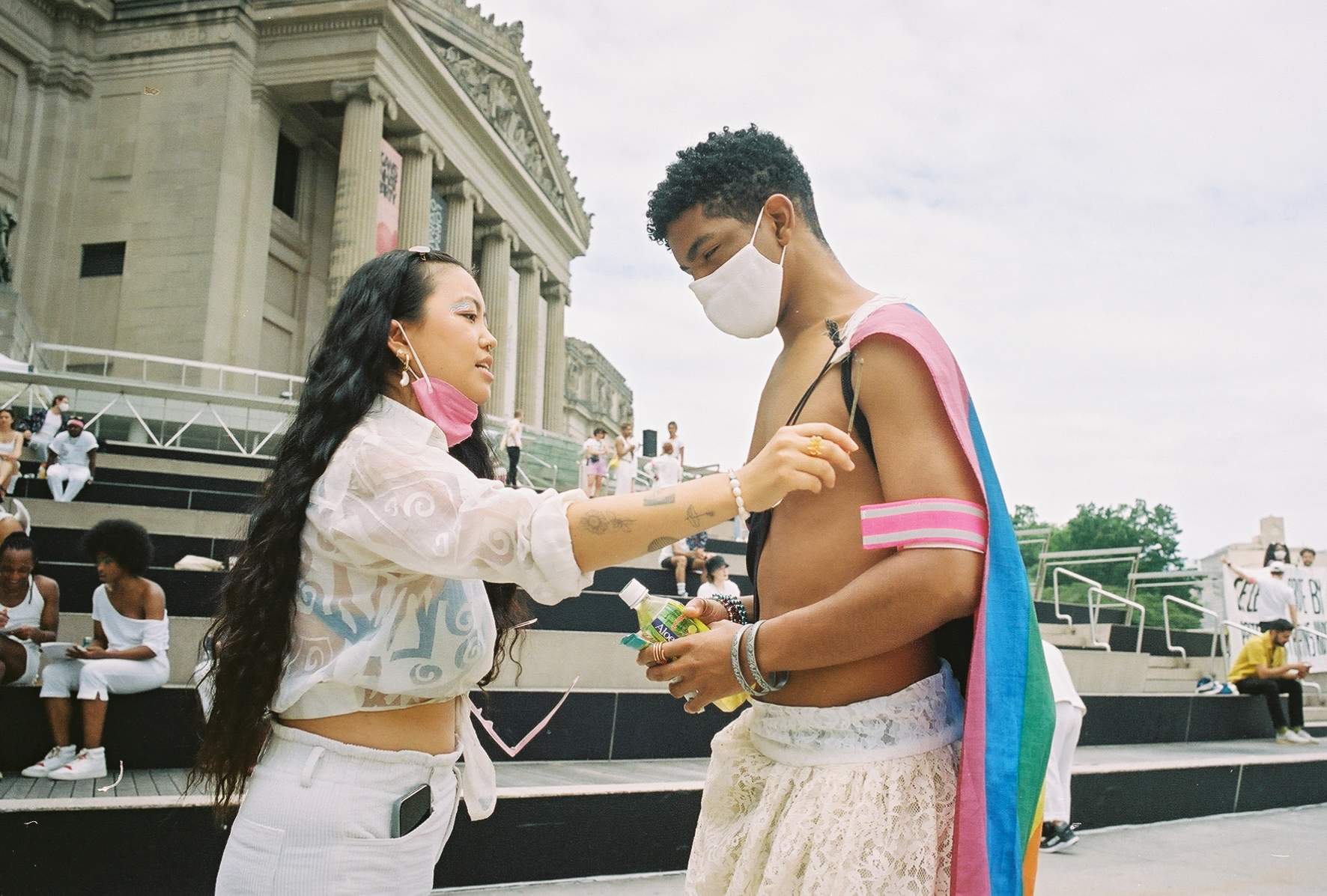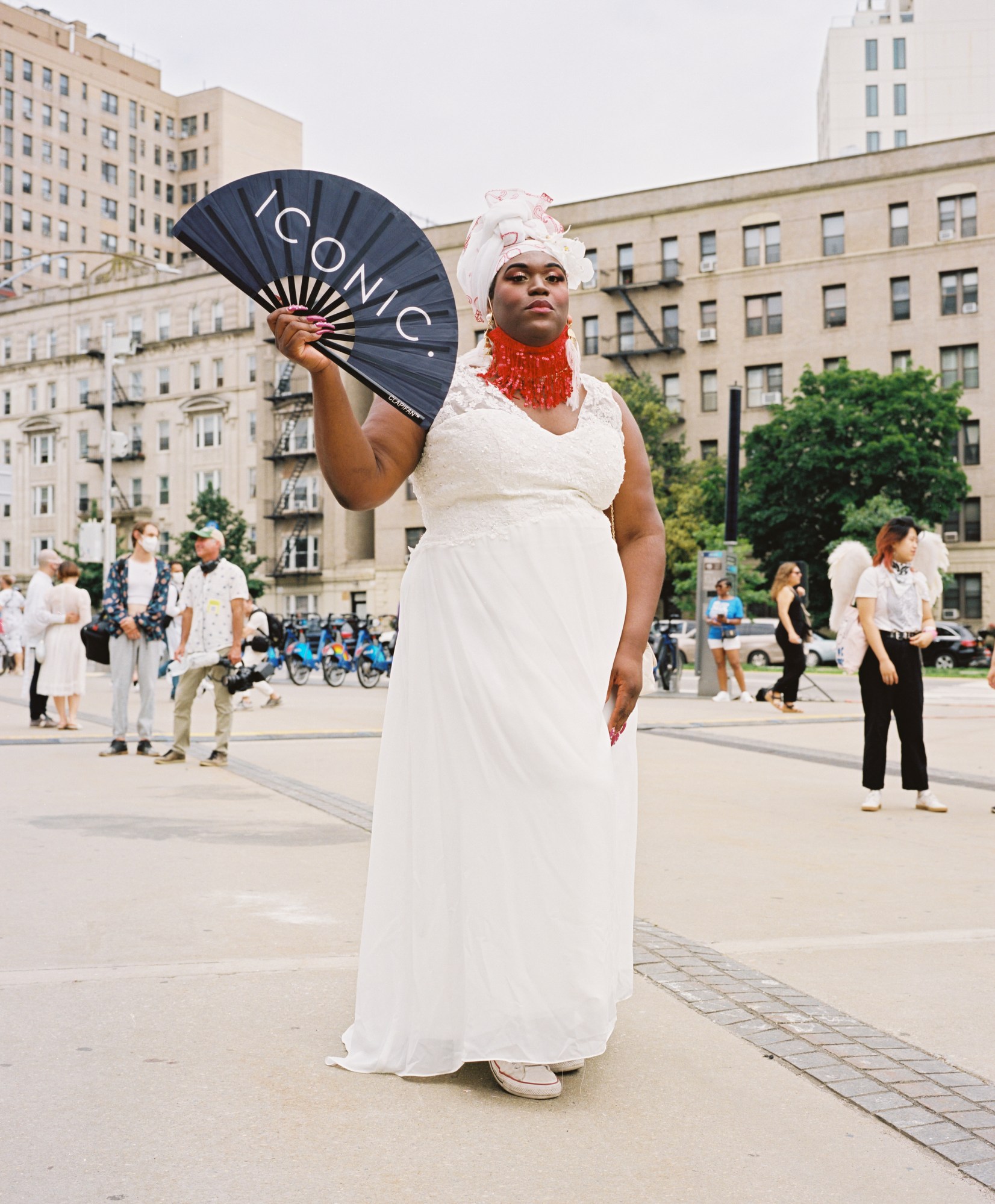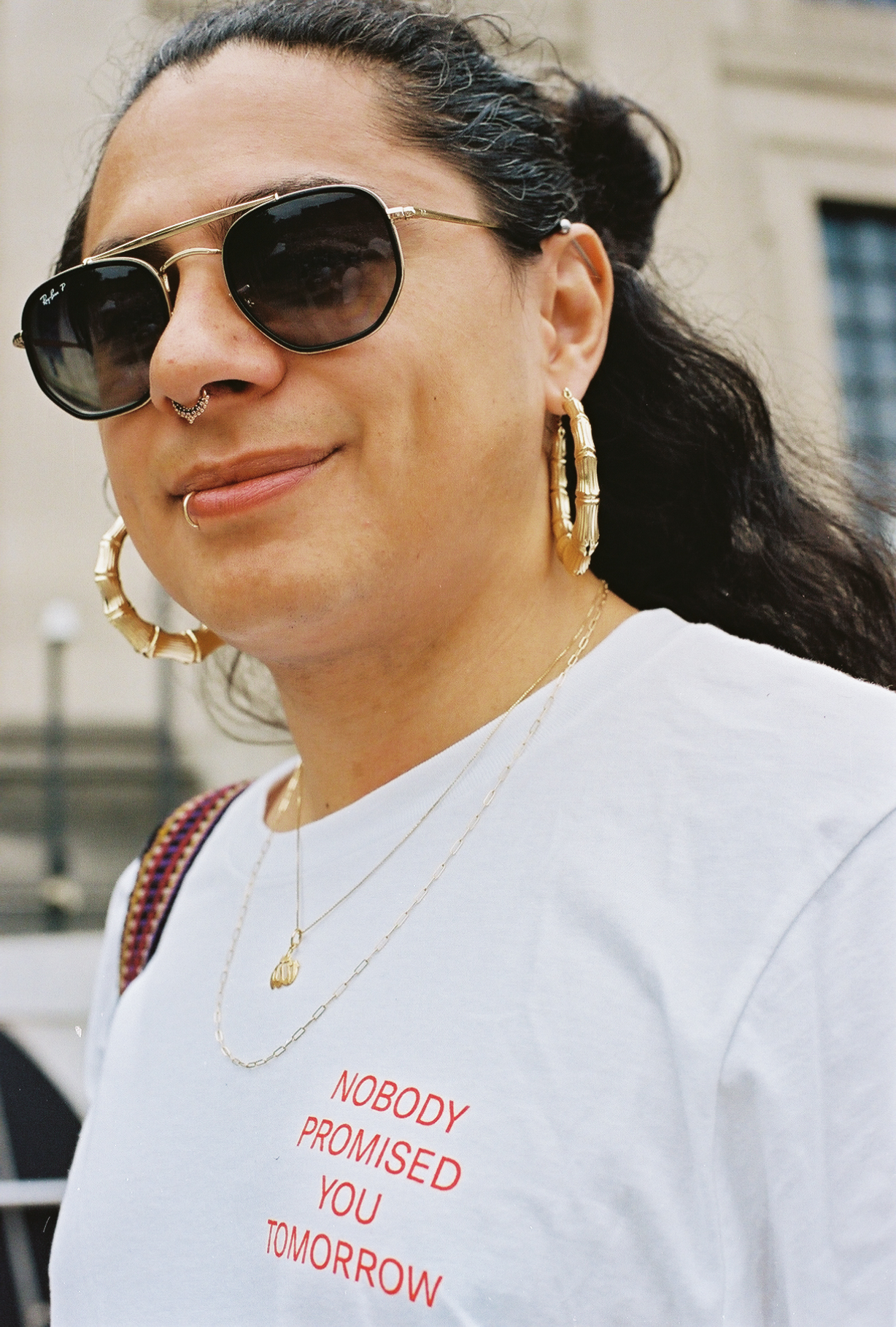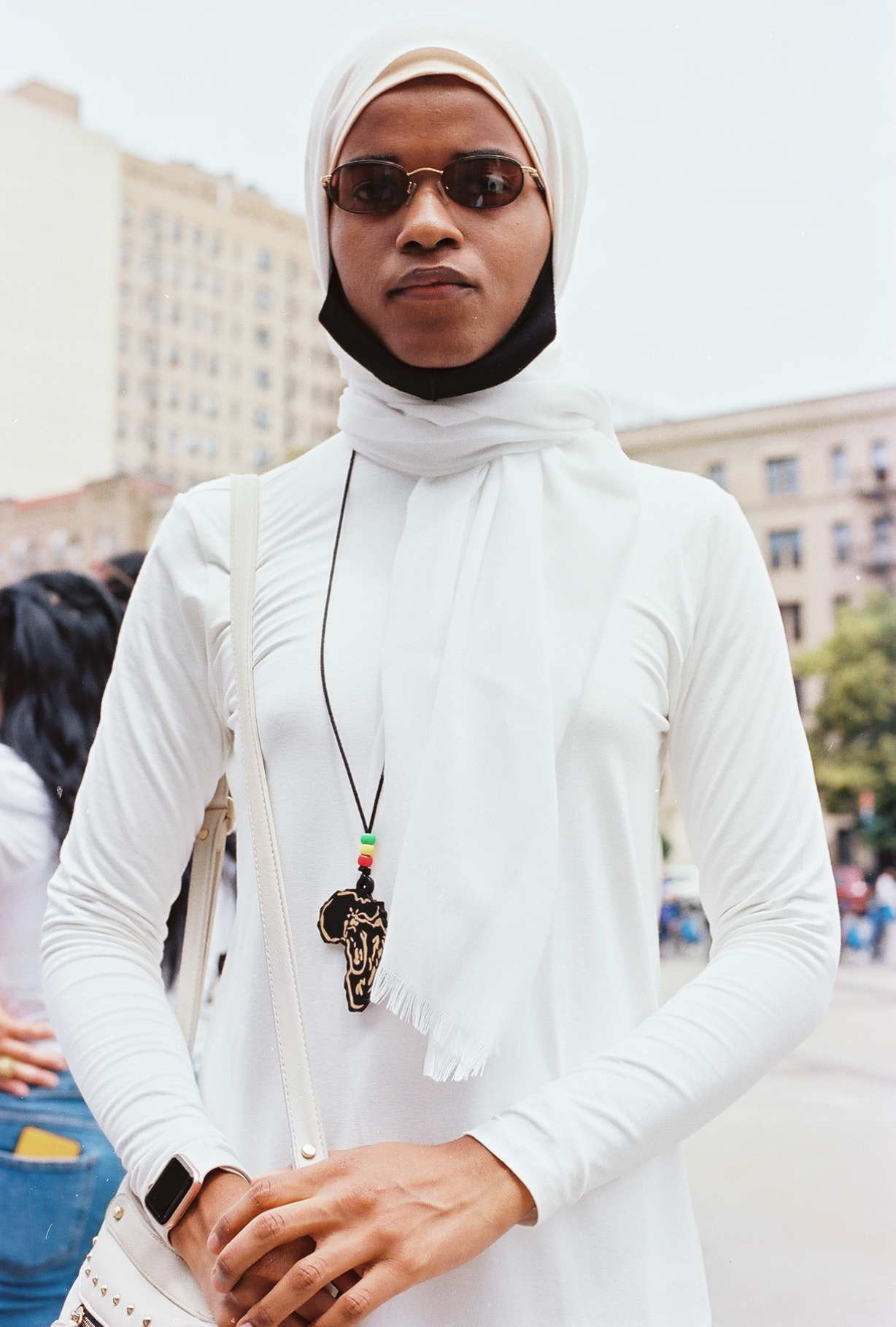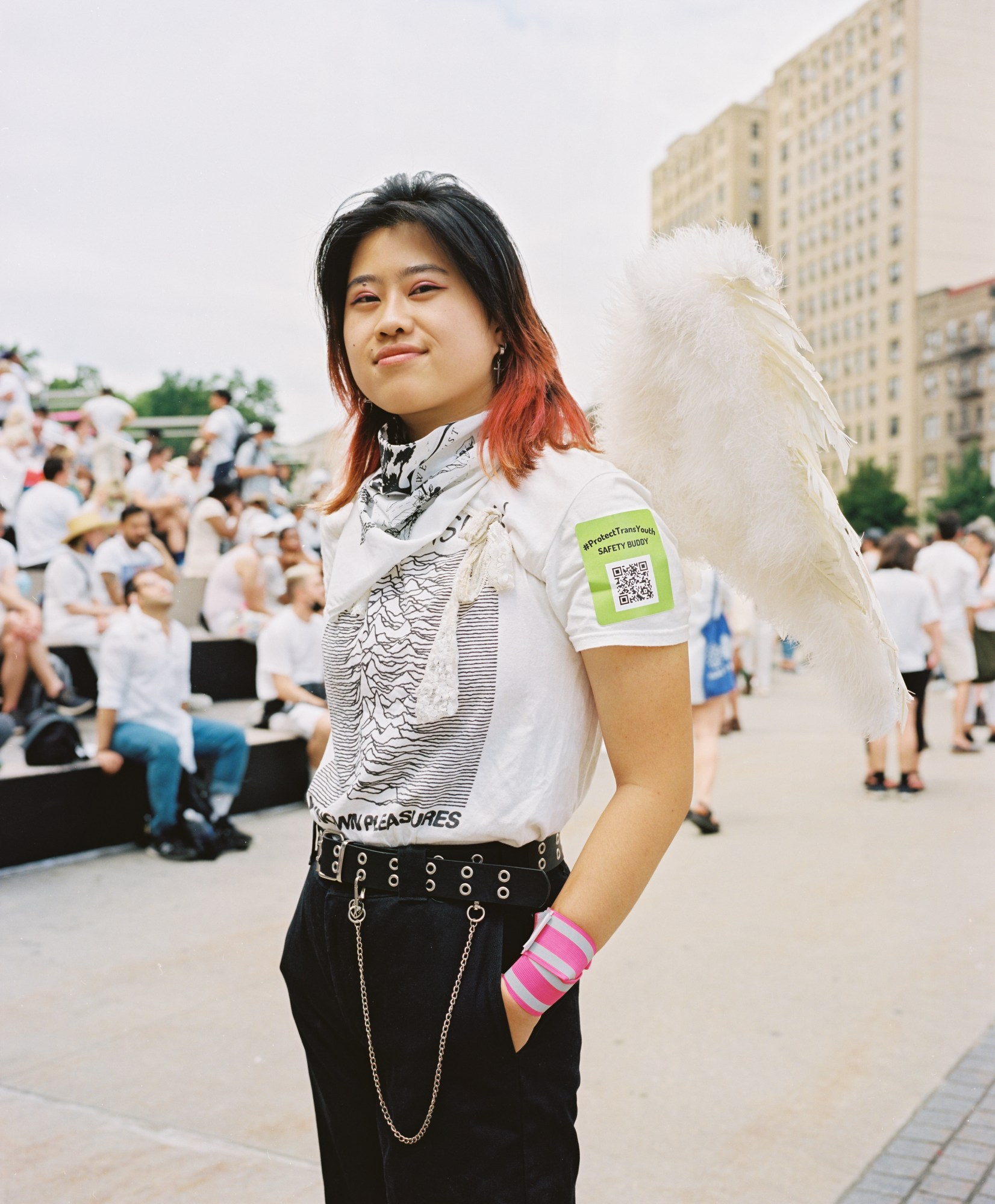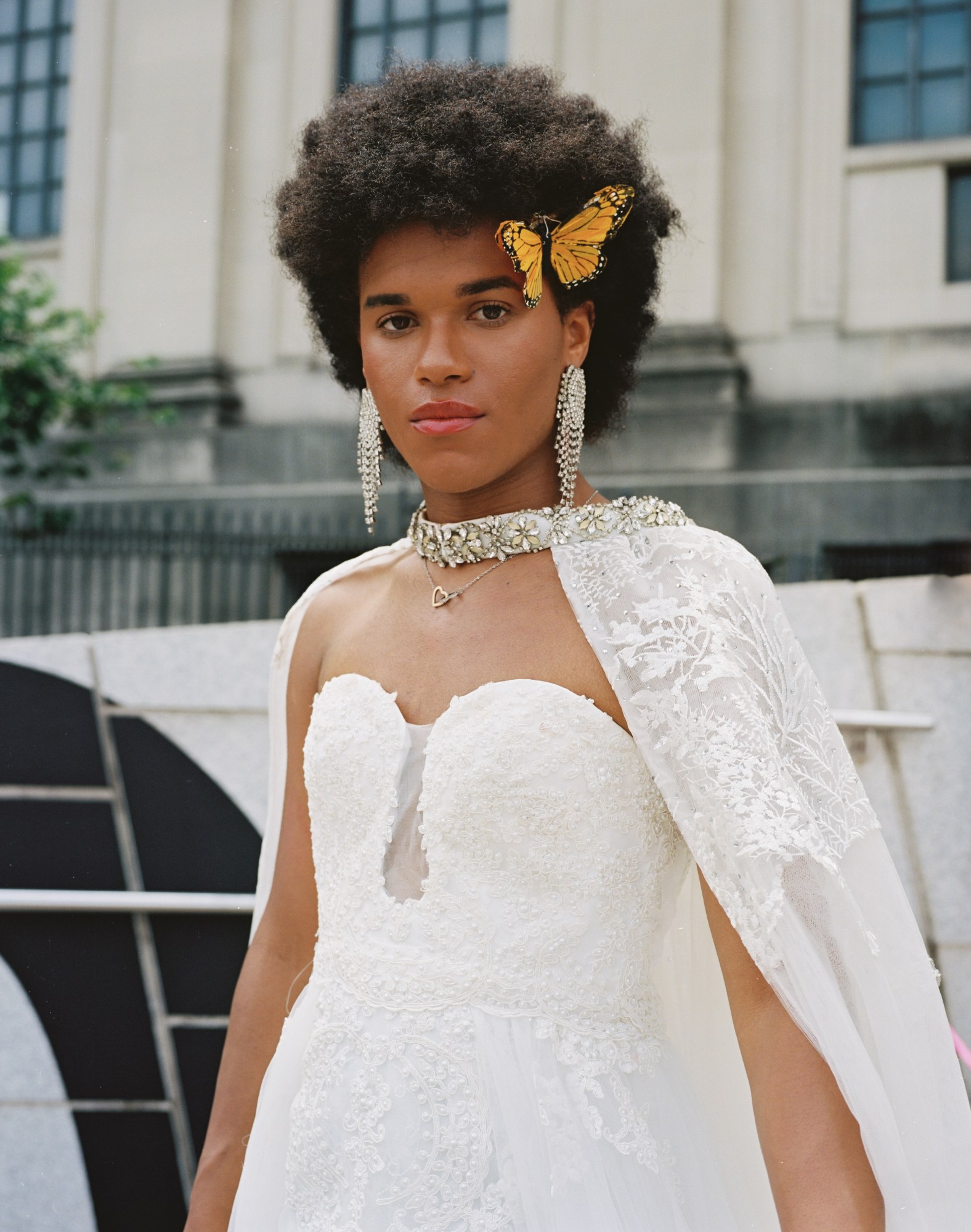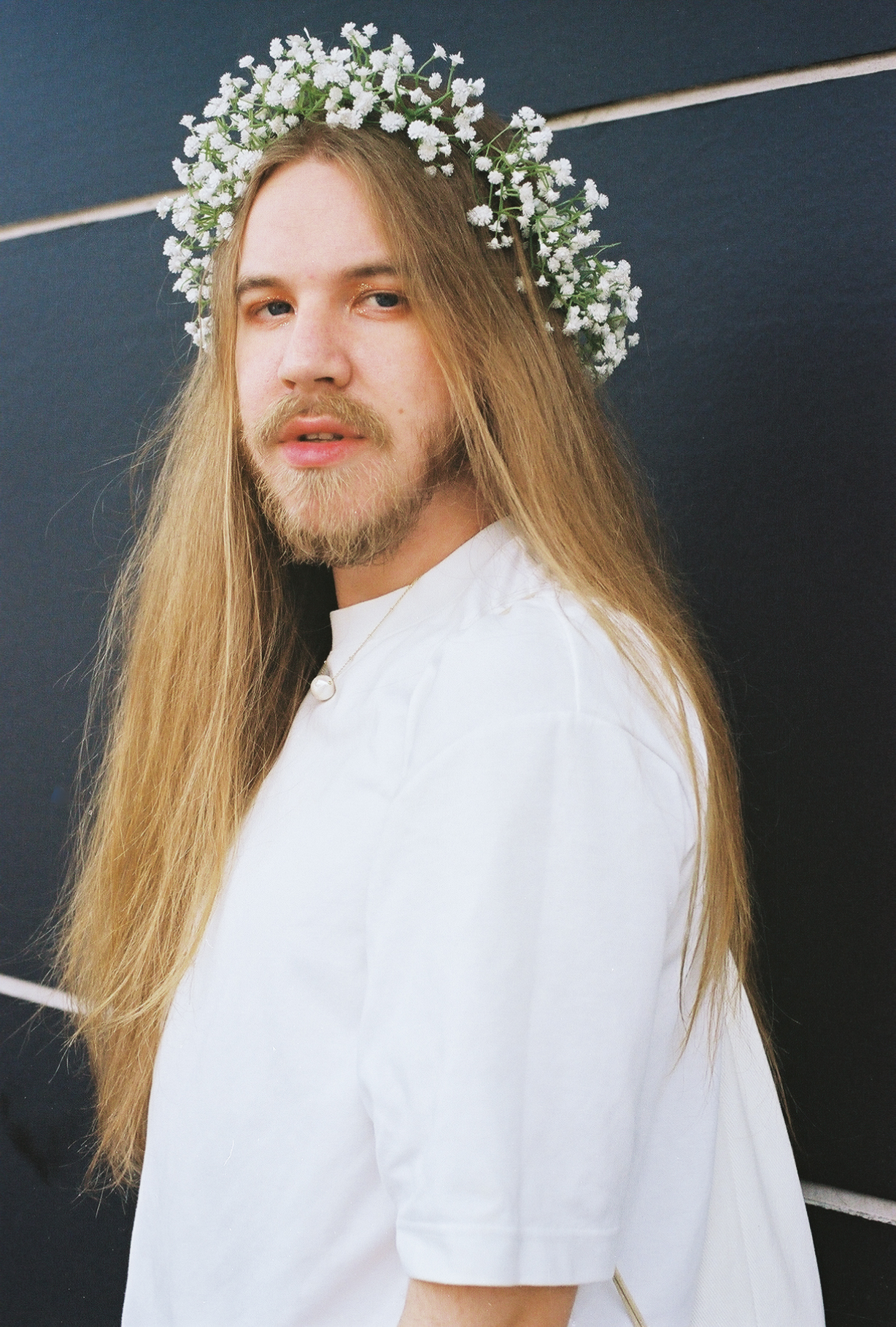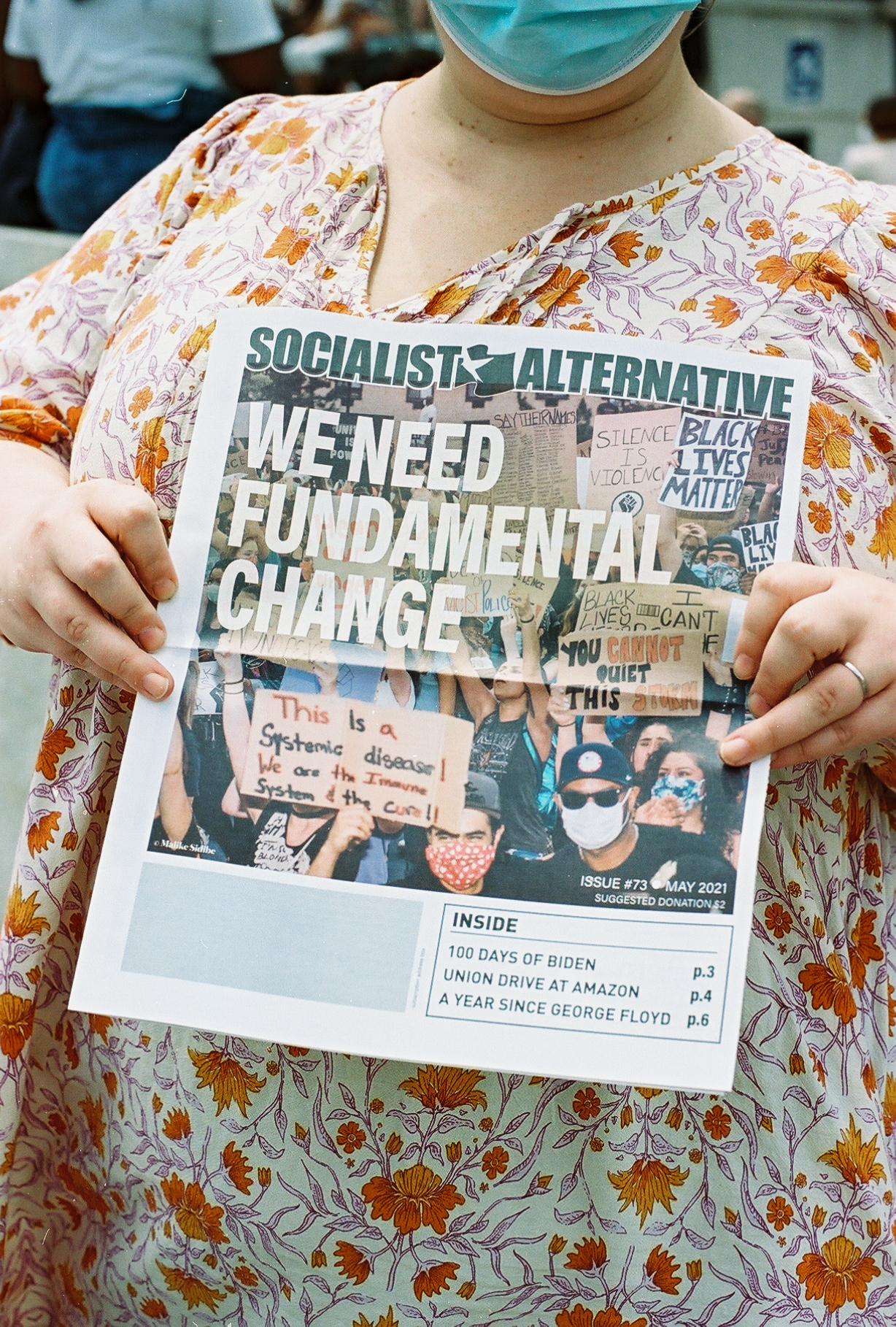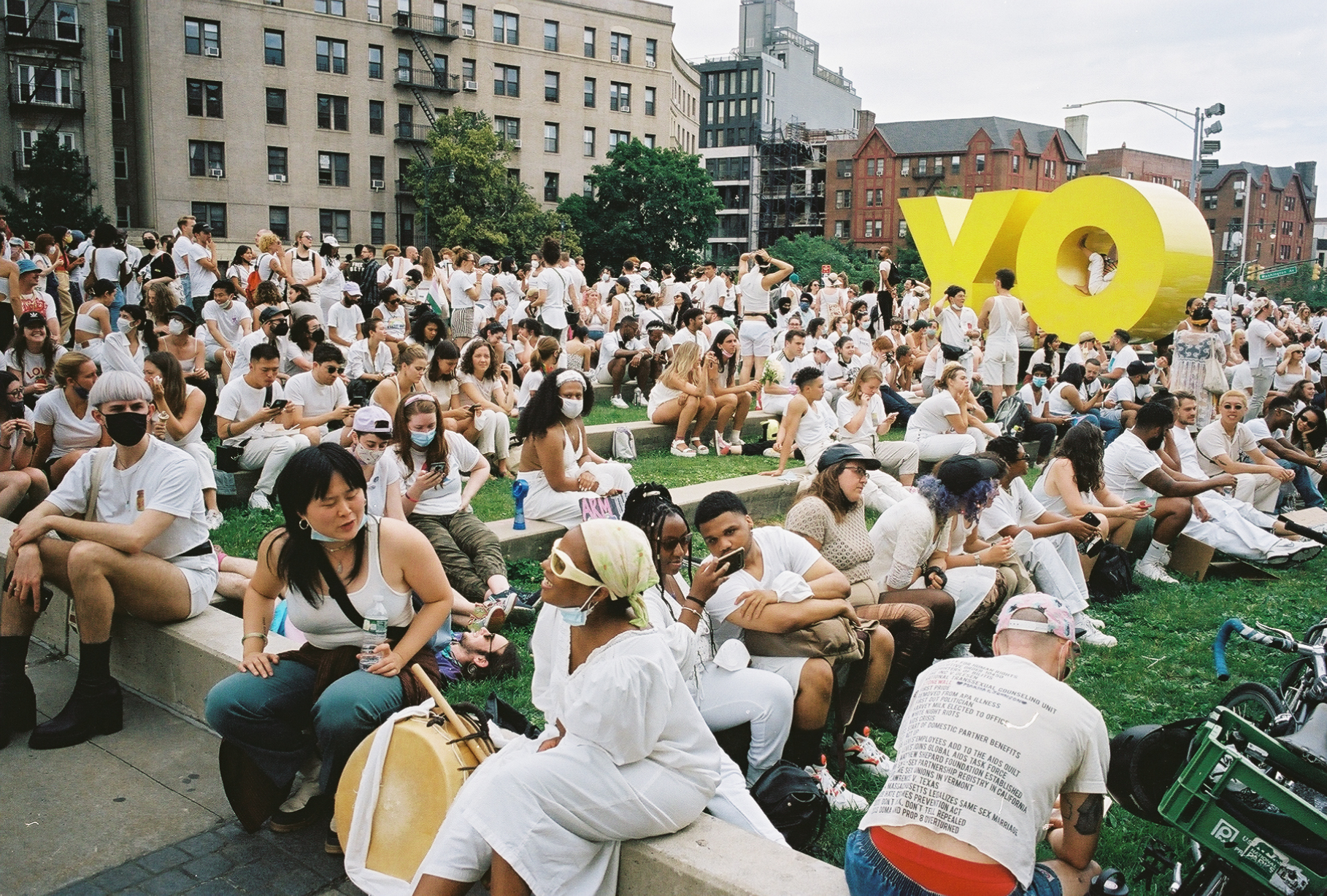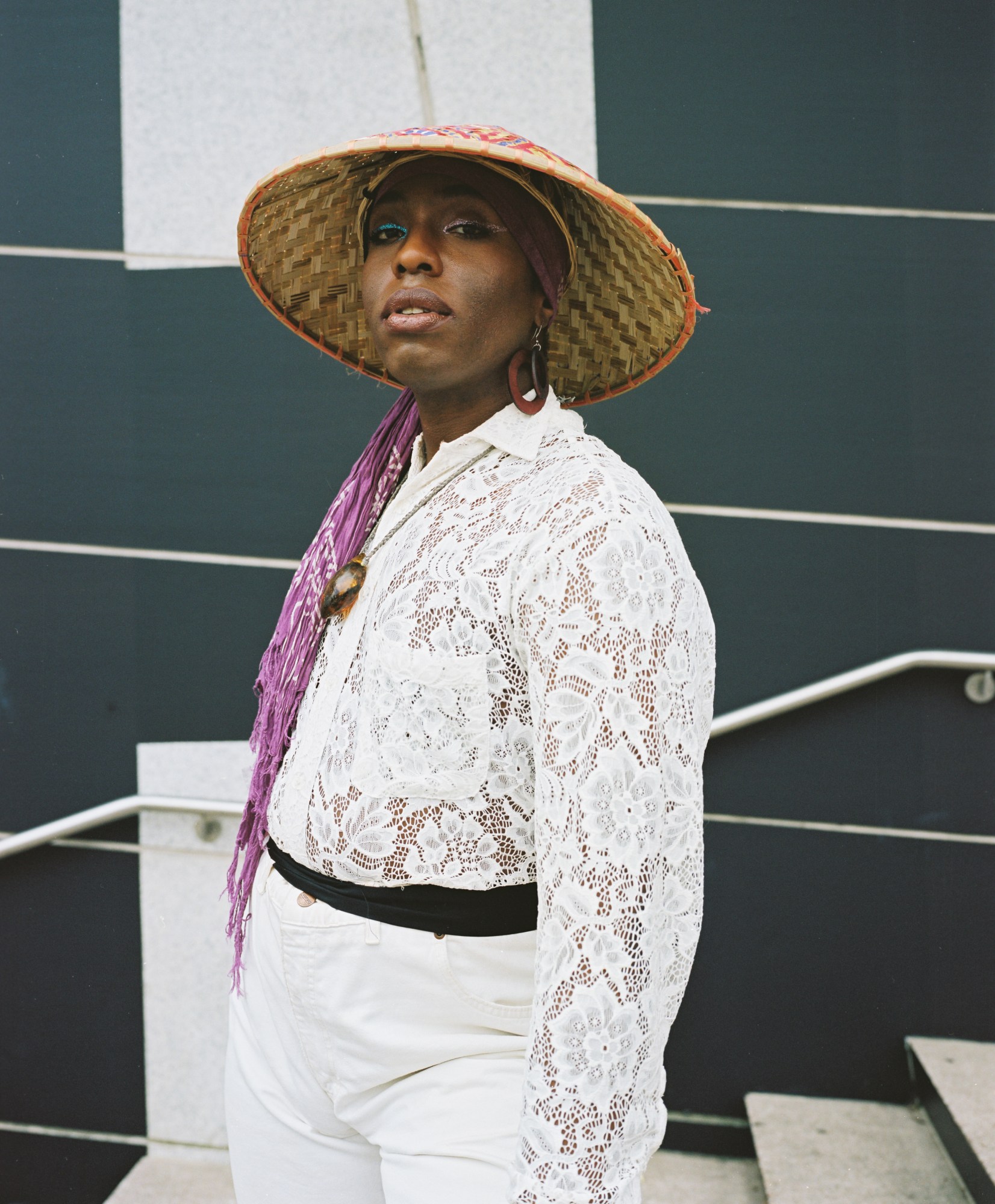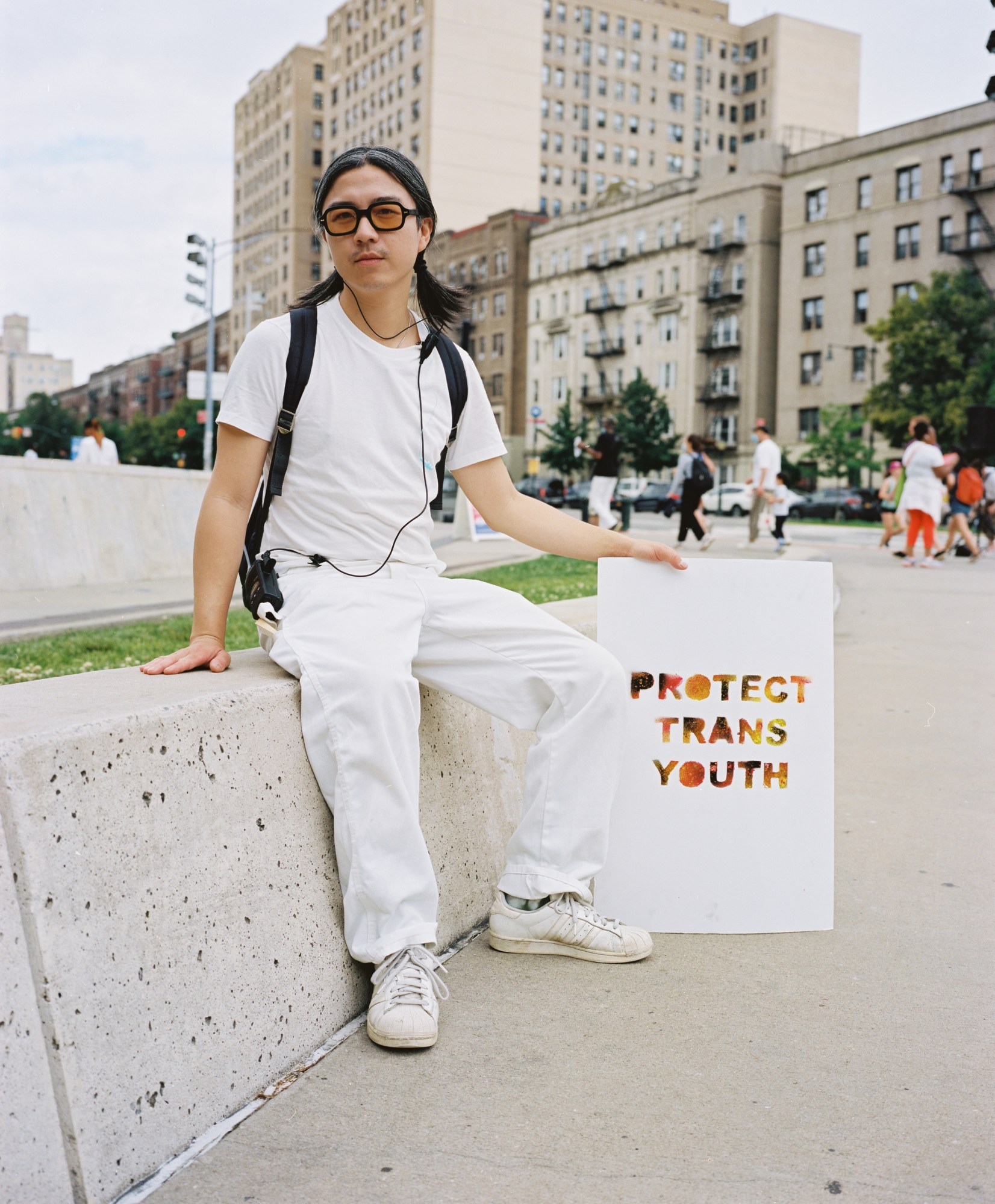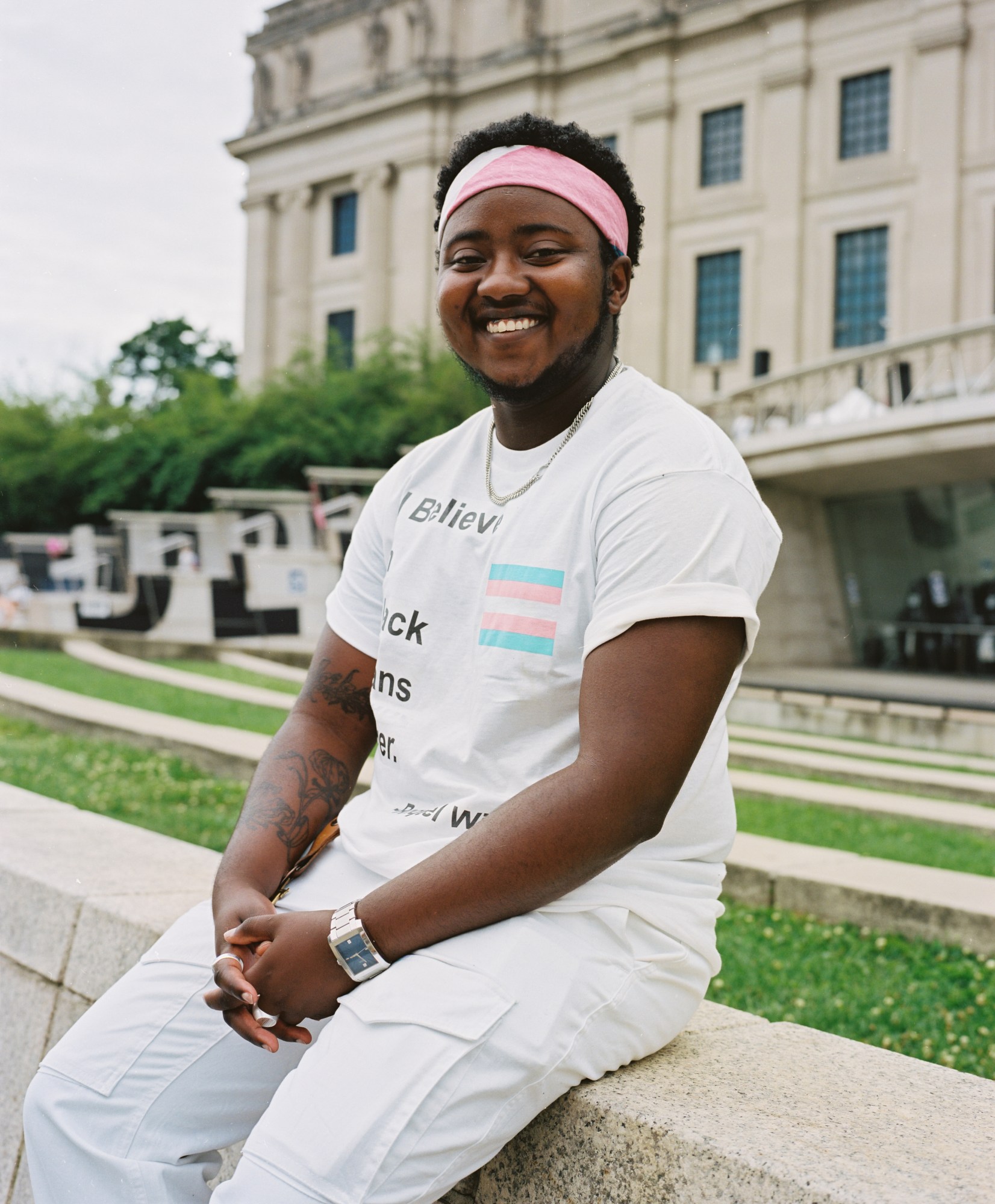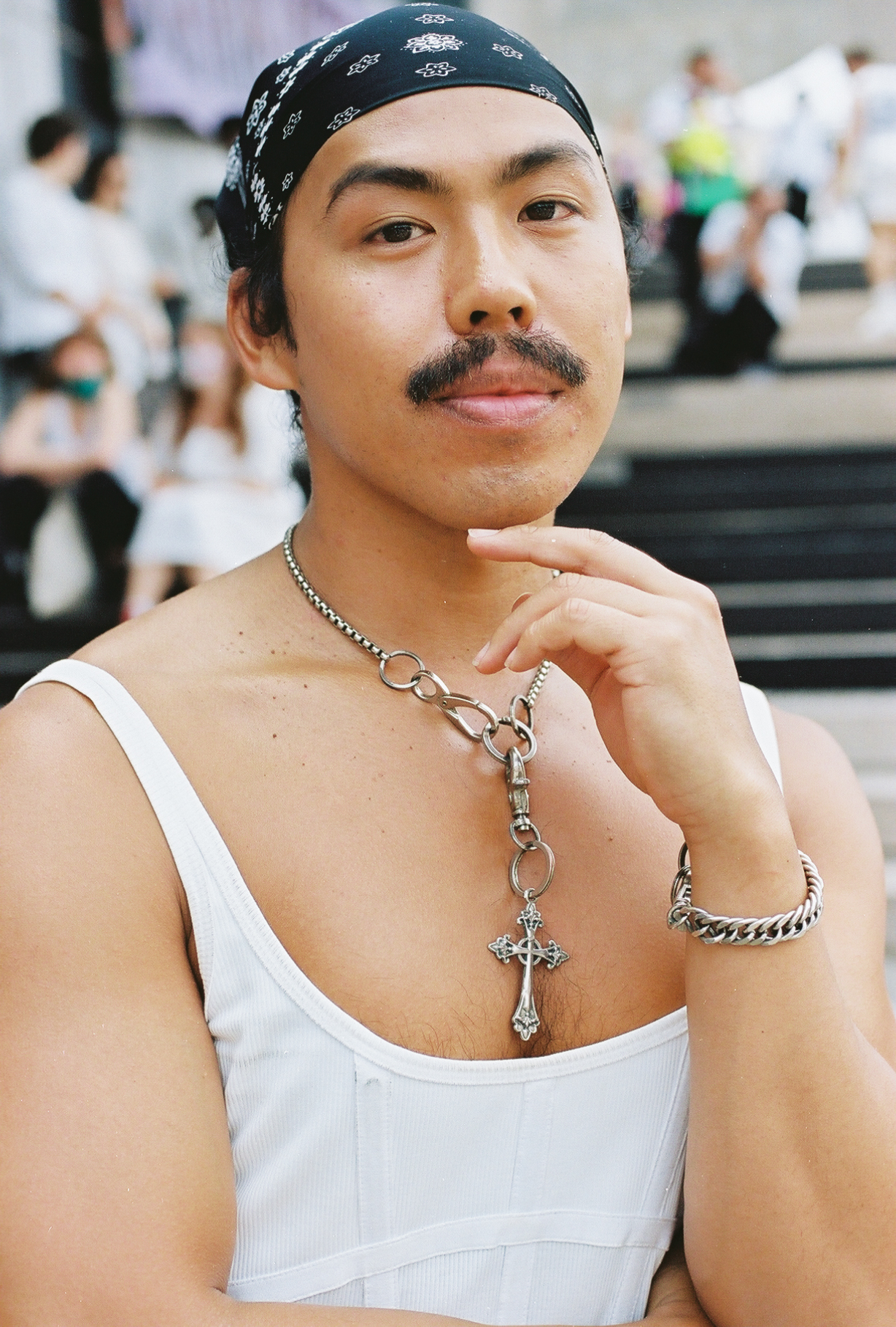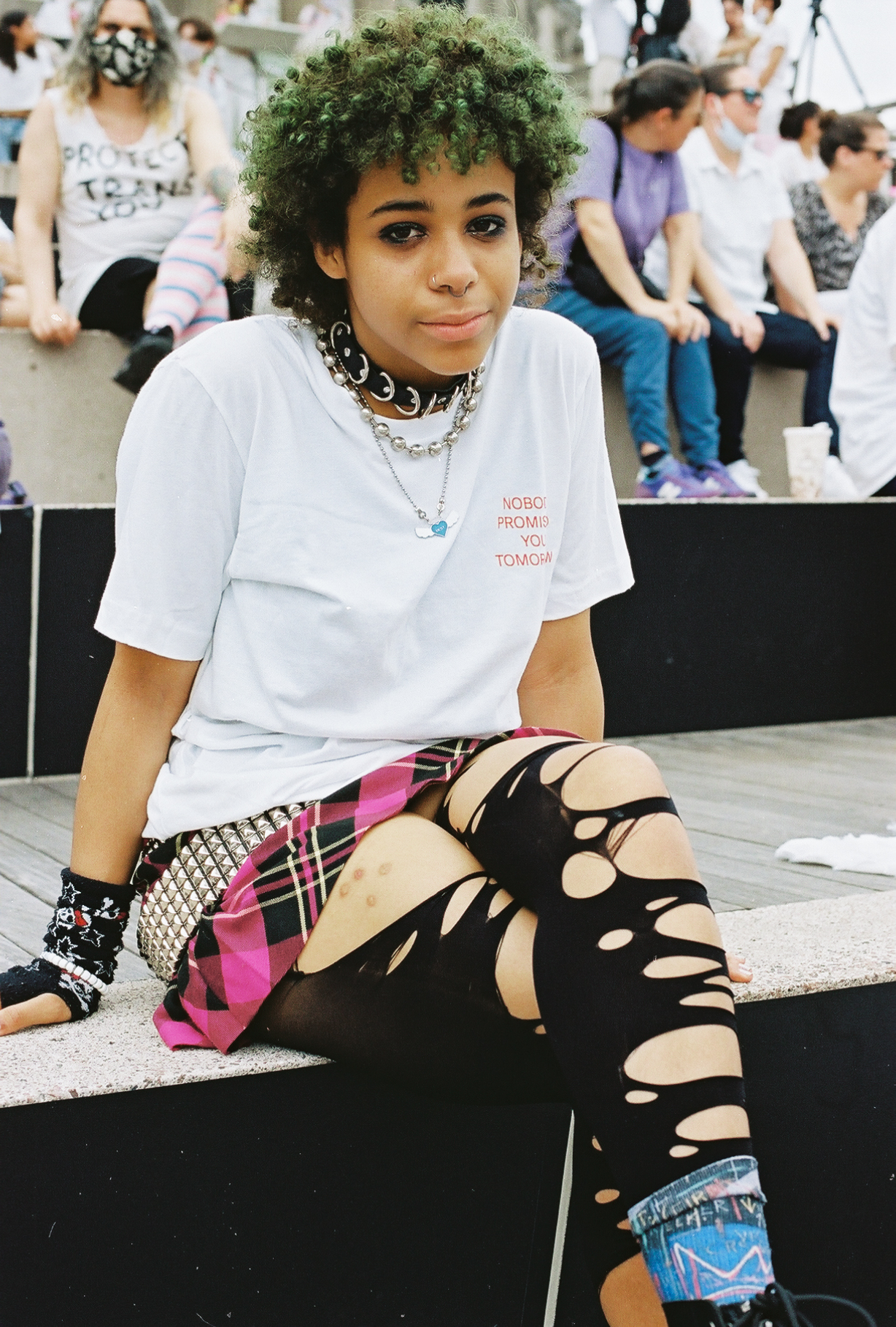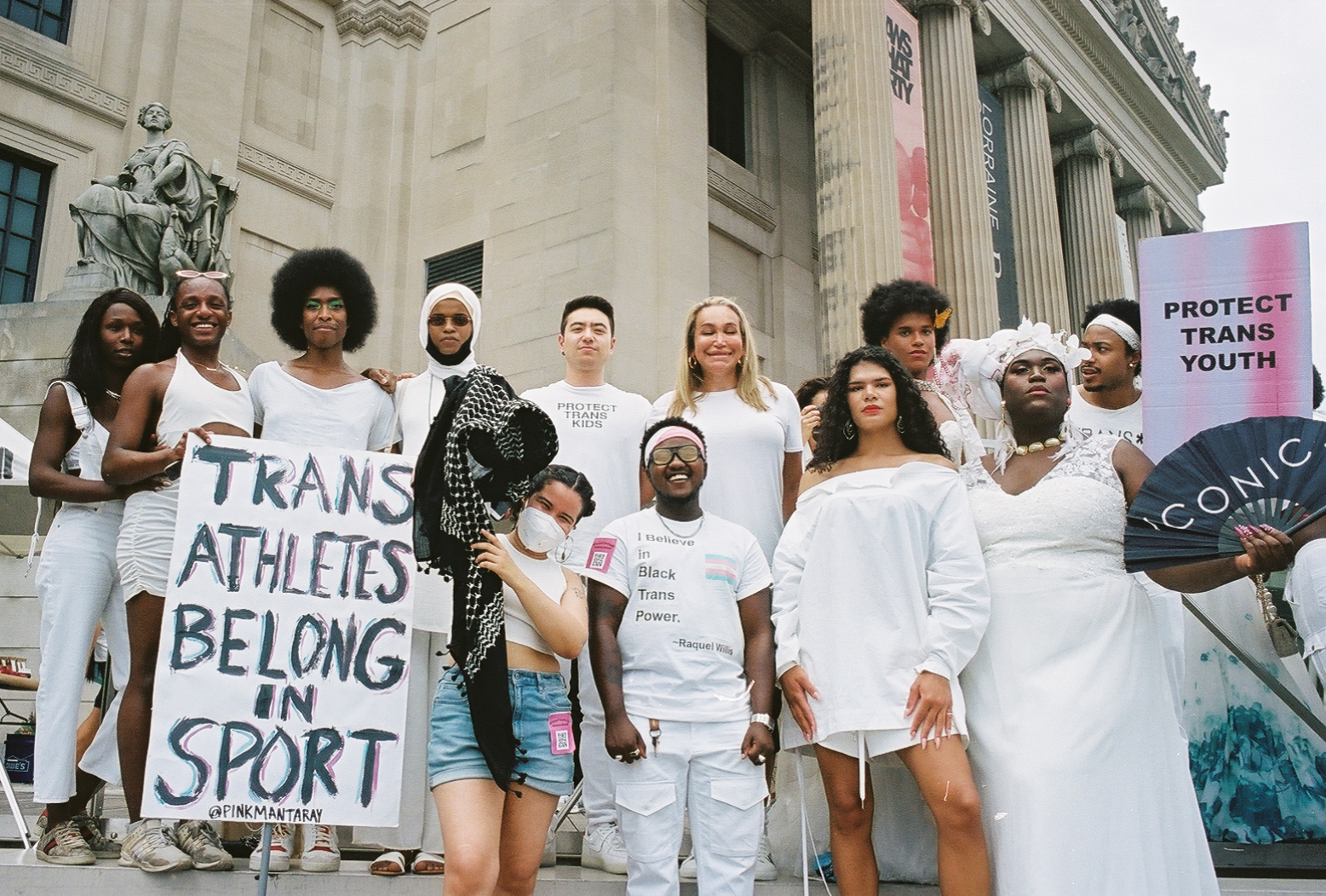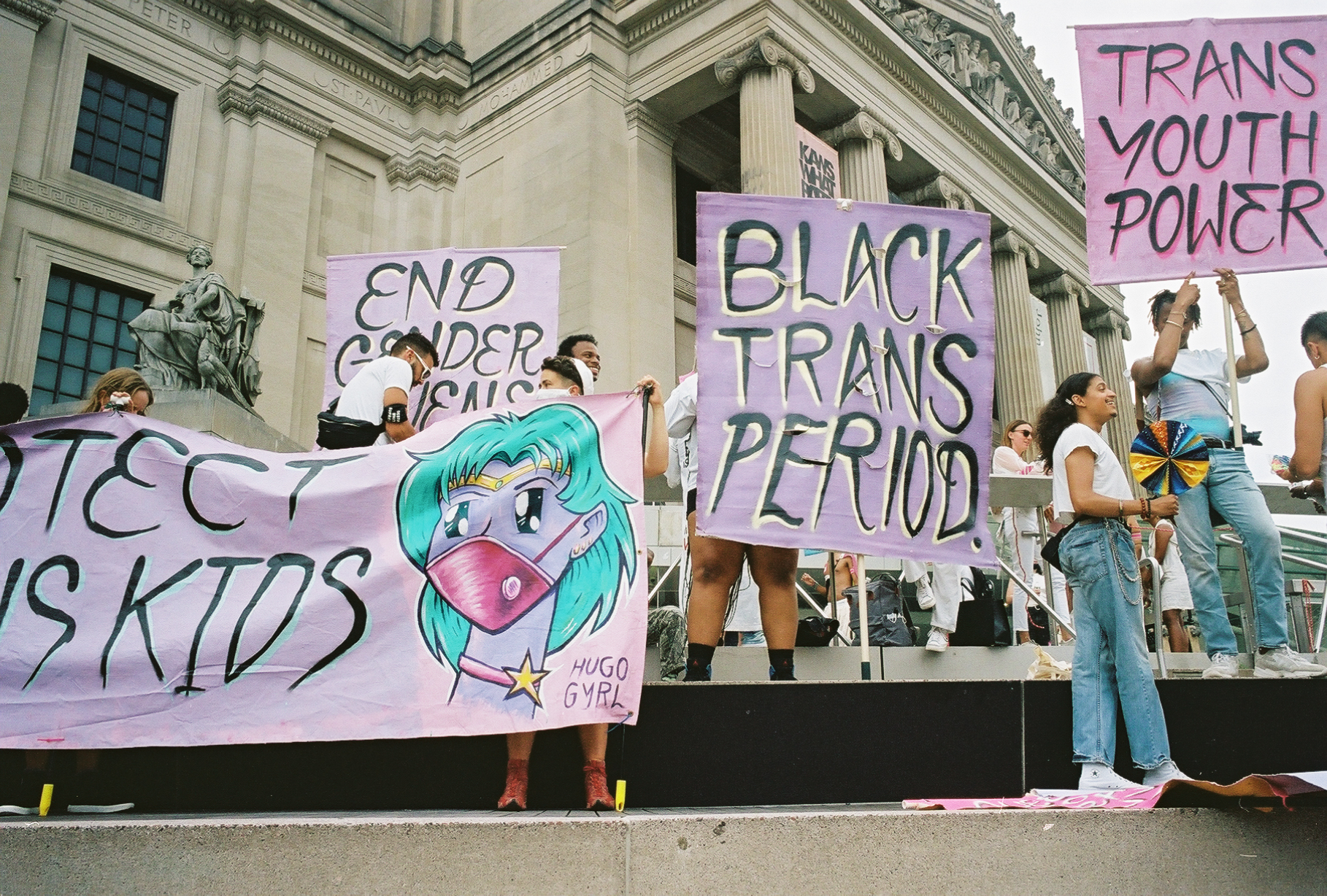Last summer, as a global uprising against police brutality and systemic racism unleashed demonstrations in response to the killings of George Floyd, Breonna Taylor, Ahmad Arbery and so many others, a community of over 15,000 people, all dressed in white, held space in Brooklyn to protest the devastating intersections of harm suffered by Black trans folks.
This past Sunday, naming the current conditions for the trans and gender-nonconforming community as a “state of emergency,” the same organizers brought thousands back to the streets for the Brooklyn Liberation march and rally, from Brooklyn Museum to Fort Greene. The goals, outlined in their statement of intent, were to demand justice for Layleen Polanco ( a 27-year old Afro-Latina trans woman who died while locked in solitary confinement at Rikers Island in 2019), stand in solidarity with the struggle for Palestinian rights, protect and empower trans youth, and spark action toward the liberation of Black trans lives.
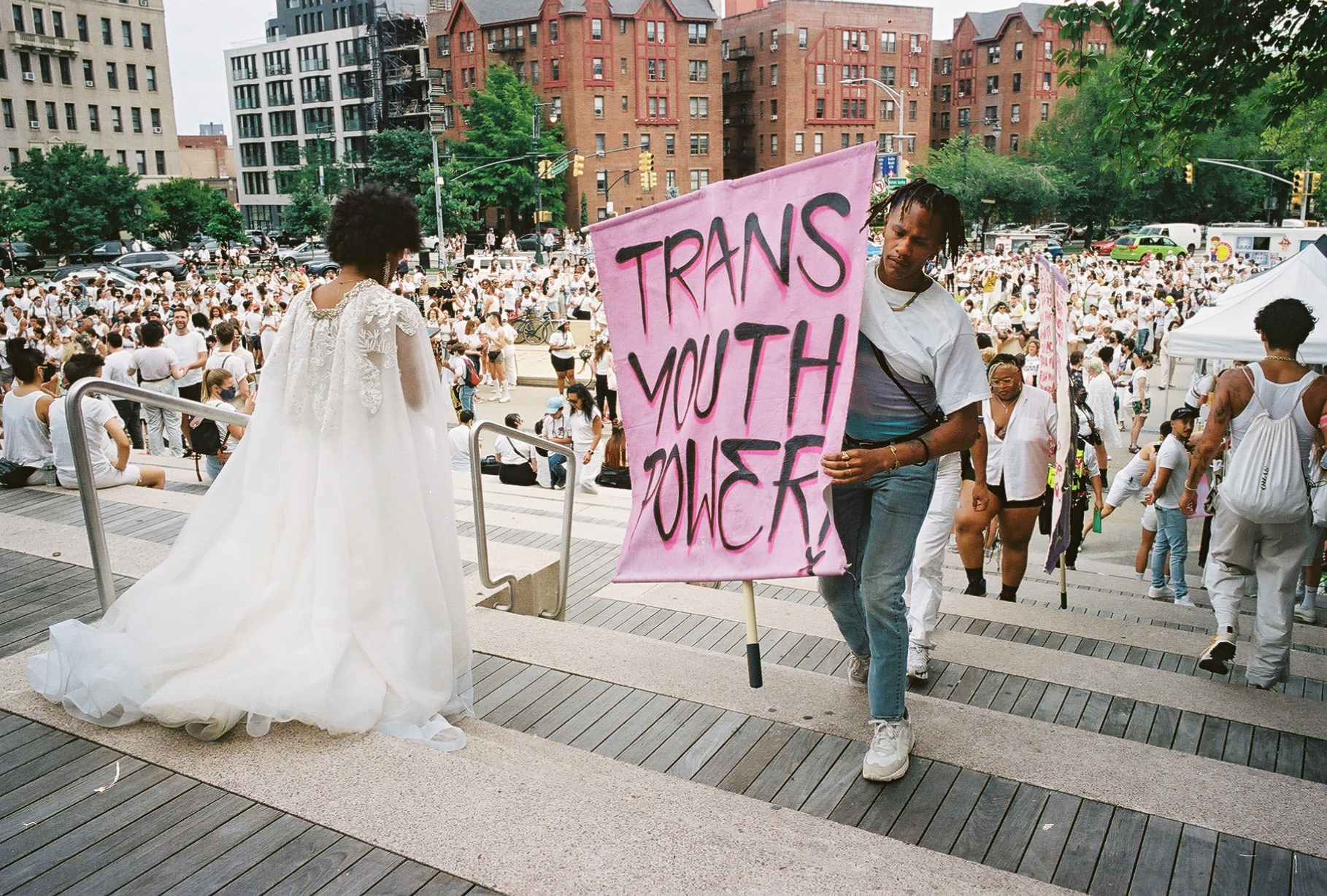
As the onslaught of the Coronavirus slowly begins to recede, 2021 continues to take shape as one of the worst years in this country’s history for anti-trans violence. At least 28 transgender or gender nonconforming people in the United States have been killed so far this year — the majority Black and Hispanic trans women — as Republican lawmakers across the nation have introduced over 100 bills in 34 states that would not only obstruct transgender youth’s access to gender-affirming or transition-related medical care, but also limit their ability to participate in sports.
We spoke to the core organizers of this powerful gathering to learn more about where their journeys to fight oppression began, the importance of expressing resistance through protest (whether online or in person) and what justice and liberation mean to them.
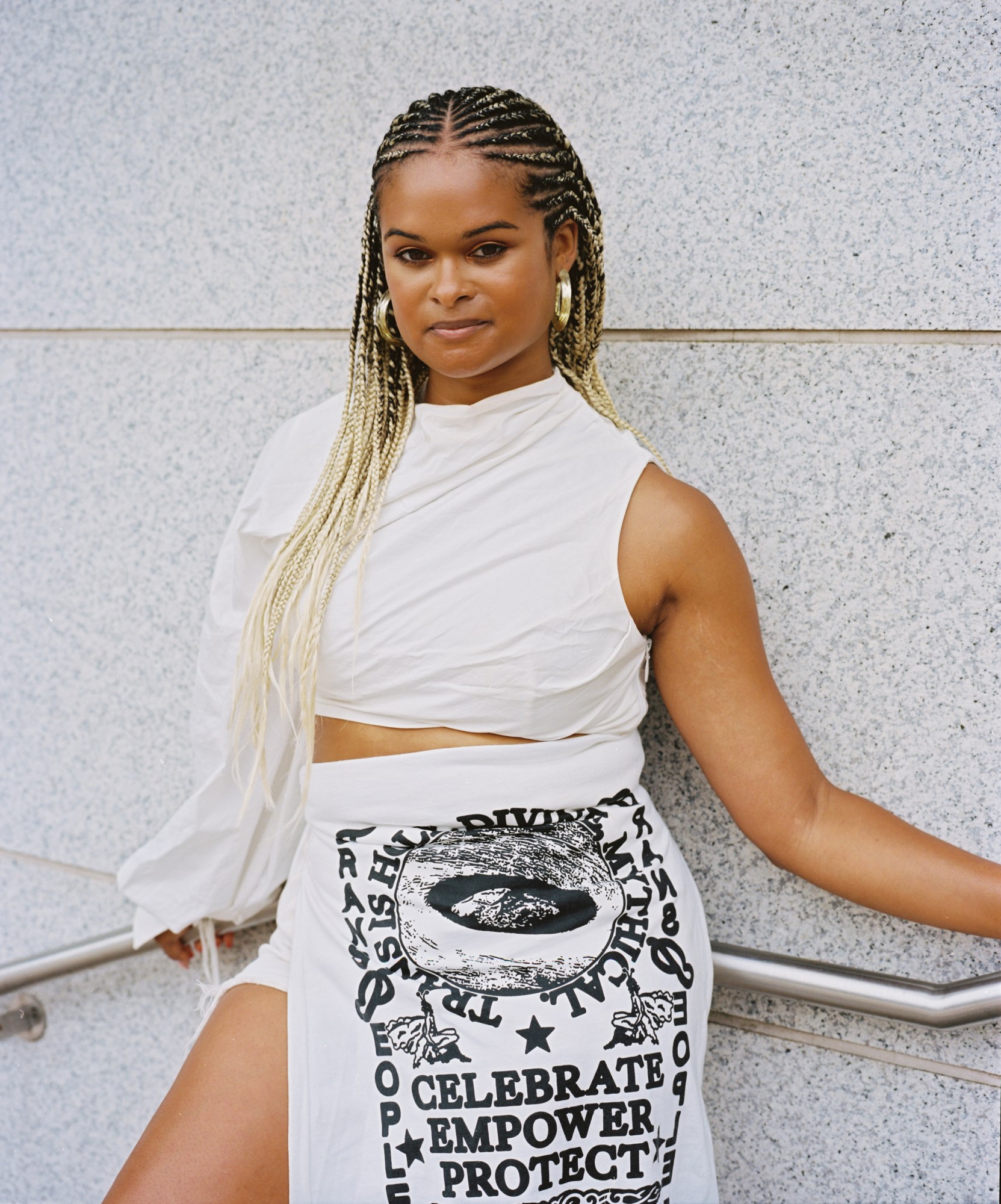
Raquel Willis
Where did your journey in fighting for justice and liberation begin?
As a queer and trans person, I believe I’ve been fighting for some type of liberation throughout my whole life. I began my activism in college, working with other queer and trans students for protections around gender identity. However, my fight kicked into overdrive after the suicide of a young trans girl named Leelah Alcorn. The letter she set to publish on social media in the aftermath of her death included a call to action for those left behind to, “Fix society.” And that’s what I’m trying to do.
In this social media age, where so much social justice dialogue is happening online, is it important to show up in person in order to express acts of protest?
Social media is just an extension of real life. So if your efforts to fight for social justice only exist in the digital space, we are only half committed to whichever cause you’re professing to champion. We all have to make a deeper commitment to changing the structural realities of people on the margins, and that means going beyond just knowing all of the latest social justice rhetoric and lingo. That means committing to transforming whatever institutions you’re a part of whether your school, company, place of worship, or other organization. And that also means we have to show up with our social justice value even within our personal relationships.
What do you hope young Black trans folks and others directly impacted by anti-trans legislation will feel when they participate in or hear about this action?
I hope that young black trans folks and all those impacted by anti-trans legislation well feel a sense of hope that the power of the people really truly will save us. I hope that they get a glimpse of what is possible when we come together across identities and experiences to build a better world for everyone. I hope that people will see the throughline from generation to generation of trans power, and that folks will never forget that we have always been here, we are doing the work now, and that we will continue to be here.
What does liberation mean to you?
Liberation for me is everyone being able to fully express themselves on their own terms without being concerned about fitting into anyone else’s expectations or boxes. Liberation looks like people understanding that the fight for trans people it’s a fight for everyone because we are all held back by restrictive notions of gender. It looks like people are understanding that the fight for black people liberate everyone. And it looks like us continuing to leave the door open just a bit wider for the next generations to come on through.
What does justice mean to you?
Justice to me should be rooted and empathy and accountability. It should reckon with the history of systems of oppression and how they continue to impact us, and it should look at writing all of those harms that have previously happened and anticipating the harm that are to come if we don’t pay attention to the needs of people on the margins.
Is there anything else you might like to share, reflect on, hold space for, or uplift on this platform?
We have to remain committed to social justice throughout our lives. There is no simple answer to being an ally, or comrade, or co-conspirator. The work is ongoing, it requires a certain amount of creativity and it requires a tremendous amount of humility. And we have to continue to see the connections between all of these fights against systems of oppression. The fight for trans liberation is intrinsically connected to Black liberation, Palestinian liberation, class celebration, and anything else that you can think of because we also and have it these other experiences as well.
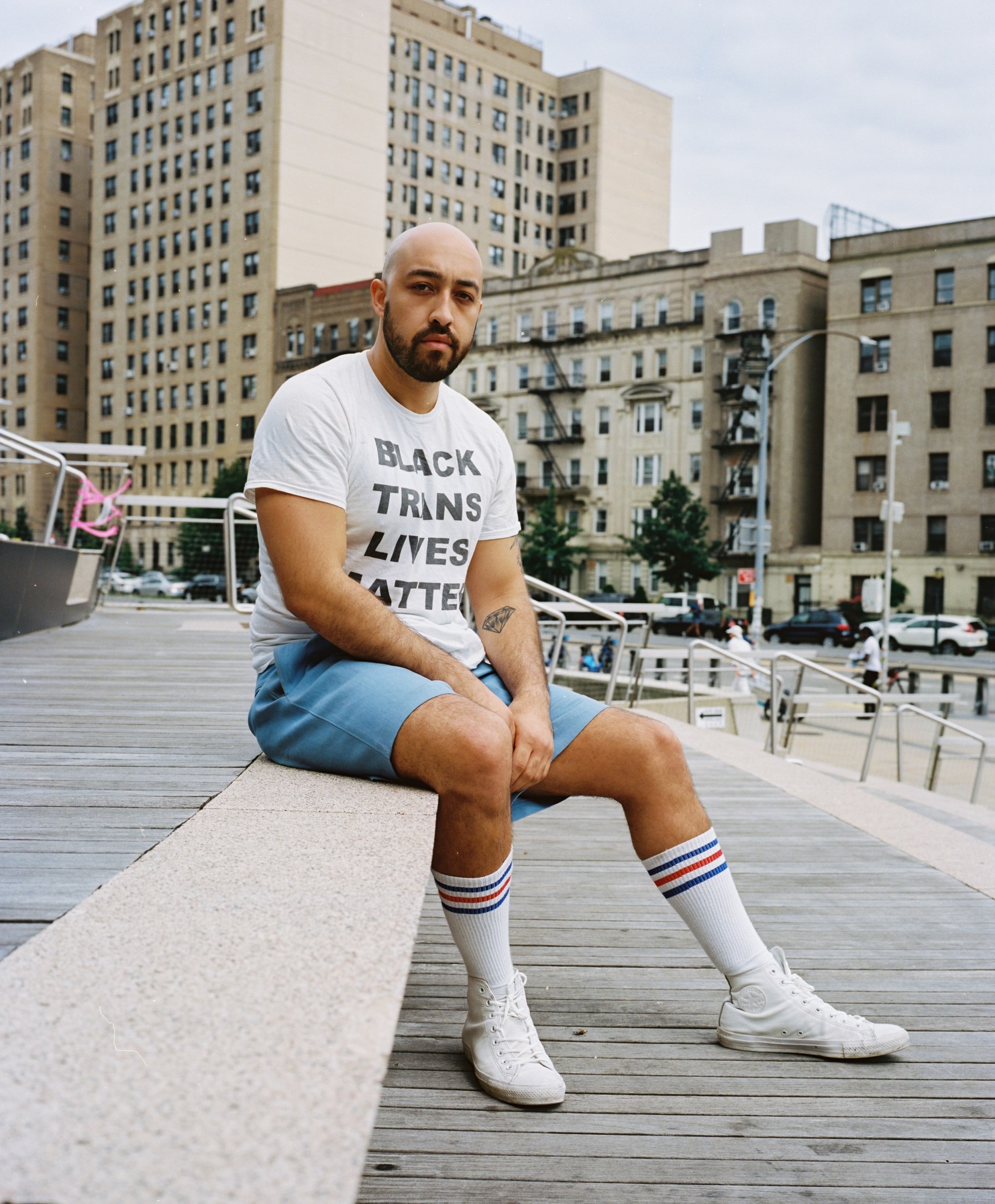
Eliel Cruz
Why is it important to show up in person in order to express acts of protest?
I love digital organizing campaigns because not everyone can physically show up to protest and digital spaces have made it possible for those who are disabled to have the opportunity to participate in digital actions that are disruptive to everyone’s day-to-day. And there are some people who are able to, but choose not to because of privilege and comfort, show up in person. We need people to show up in their day to day lives in ways that are in line with their claimed political stances. That means being consistent and holding their family and friends accountable. It means donating to trans-led orgs, researching anti-trans bills and calling your elected officials, and yes, showing up in person for a protest centering trans youth not just liking the photos of it on instagram.
What do you hope young Black trans folks and others directly impacted by anti-trans legislation will feel when they participate in or hear about this action?
My prayer is that young trans siblings are feeling seen and loved. Especially to those who may not be in supportive home environments or safe educational spaces–I hope they know that we’re paying attention and fighting with them.
What does liberation mean to you?
Liberation is having everything we need and desire in abundance simply because we exist and are worthy of it.
What does justice mean to you?
Justice is eradicating the systems that allowed for the harm to take place so no one other person or community is harmed in the same ways again.
Is there anything else you might like to share, reflect on, hold space for, or uplift on this platform?
I believe we are in an important historical moment in which we’ve never been before. Last summer we saw people activated in ways they have never been before demanding justice and accountability for the violence of policing. It’s important, now more than ever, to continue to pay attention to what is happening and be plugged in, consistently and insistently, doing your work towards Black Trans Liberation.
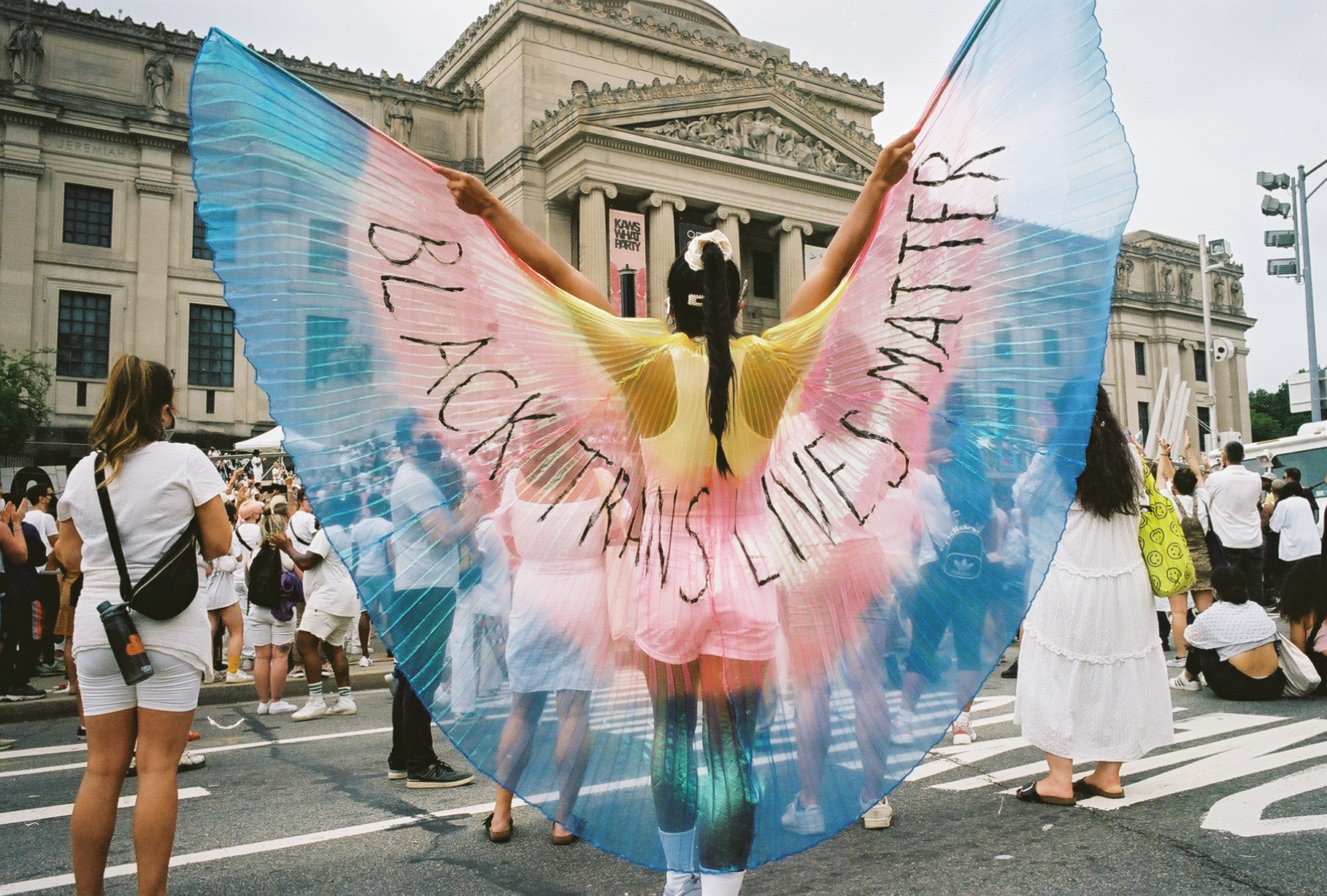
Robyn Ayers
Where did your journey in fighting for justice and liberation begin?
In 2014, I was at a protest for Eric Garner and Mike Brown. I spent hours in a police kettle at 42nd Street – inhaler clutched in one sweaty hand, staring down the orange barricades and flashing lights. I had come by myself, but to say that I was alone couldn’t be further from the truth. I was surrounded by a community of Black women who checked in on me, took care of me, made sure that I got out and got home. Home, at the time, was my dorm room at a predominantly white institution. To be allowed in, I had to show my ID to an ex-NYPD officer. I remember wondering if they could read the terror on my face; if they could tell where I’d been by my glazed over expression. I remember wishing for the comfort of the Black woman who had earlier offered me a smile and steady hand. That night – shifting from one police-governed space to another – was when I began to understand the depths of this call. Not just to tear down the current world, but to build and build and build until community imagination becomes reality, until my hands are a steady offering for the lonely, until every Black and brown other kid remembers how to smile.
Why is it important to show up in person in order to express acts of protest?
Social media (even for all its benefits and accessibility) allows folks with privilege to scrape by with symbolic declarations of allyship. It allows us to stay within our bubbles of familiarity, removed from any tangible effort & the accompanying discomfort. Showing up in person challenges folks to see – really see – the humanity of the community they claim to stand for. Once you’ve recognized and fully embodied the humanity of the struggle, that’s when you begin to truly move towards an attitude of transformative solidarity.
What do you hope young Black trans folks and others directly impacted by anti-trans legislation will feel when they participate in or hear about this action?
Existing at one of the most vulnerable points of intersectionality is bone-chillingly lonely. If young Black trans folks can feel that isolation lift for even a moment, it will all have been worth it.
What does liberation mean to you?
Liberation means a world of possibility and perpetual learning. Liberation means relationships and communities built on kind honesty and radical love. Liberation means interacting with each other by invitation, not threat of consequence. Liberation means centering consent and community over ego. Liberation means acknowledging and holding all of our differences and similarities as part of a tapestry, not a competition. To quote Lilla Watson and the Aboriginal Rights group of Queensland: “If you have come here to help me, you are wasting your time. But if you have come because your liberation is bound up with mine, then let us work together.”
What does justice mean to you?
Justice is breathing bravery into our veins to move us past the stagnancy of shame and towards the vulnerability of accountability. Justice leaves behind “Who can I blame?” and instead asks “What do you need?” and “What do we want to build?” and “How can I support you?”
Is there anything else you might like to share, reflect on, hold space for, or uplift on this platform?
There is space for you. There is space for each and every one of your polarizing truths. “Yes, and” is not just a comedy improv technique. “Yes, and” is embracing the multiplicity of your identity, and the multiplicity of the world around you. How far can your imagination reach? Where can your heartstrings fly? Remember – you do not have to martyr yourself for the sake of this work. A better world is not something we have to earn, but it is something that we have to work for. Choose the pain that takes you in the direction that you want to go.
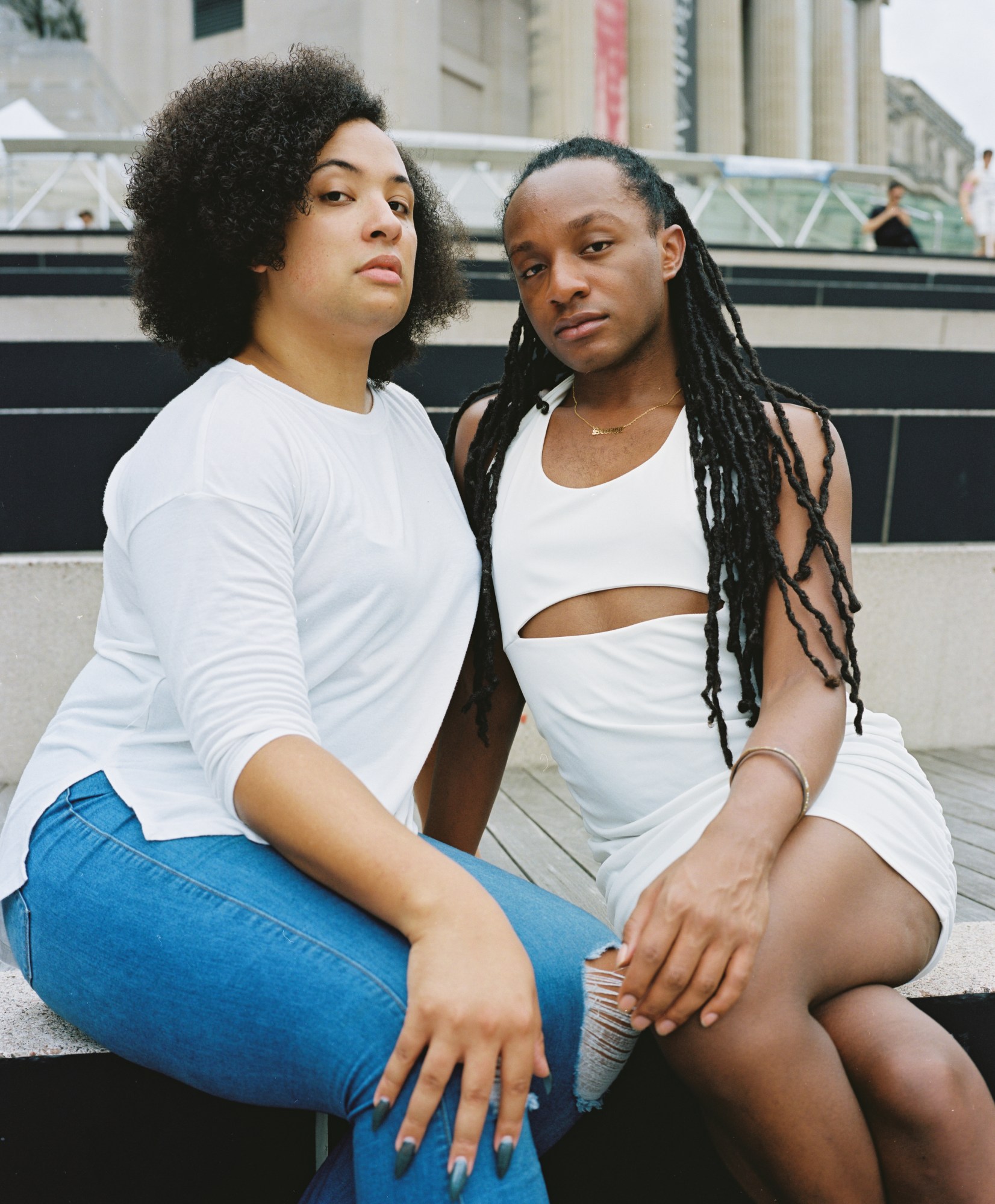
Ianne Fields
Where did your journey in fighting for justice and liberation begin?
Growing up in Birmingham, as a Black girl denied of her girlhood I was always keenly aware that my presence in the world was a resistance of an (at the time) unnameable code of conduct that was rigidly enforced. When I went to a predominantly white college and pursued a BFA in musical theatre, I realized that there was no way that any predominantly white space would ever be able to hold the totality of my being. The summer after my sophomore year, I was introduced to organizing strategies and principles. For the first time, I could name the unnameable, and from there, I never stopped naming what I saw and striving to do something about it.
Why is it important to show up in person in order to express acts of protest?
I am not as brilliant as many of the organizers I share community with, and so social media remains a mystery to me in many ways. That being said, I firmly believe that organizing must always reflect the humanity we reflect in each other. If the pandemic taught me anything it’s that a screen can never properly convey the deeply human experience of seeing and being seen by another person or persons. I also think it is important for us to always remember that Twitter, Facebook, Instagram, and the myriad of apps that make up social media are still owned by the richest, most corrupt, and inhumane white men whose algorithms were never designed with liberation in mind.
What do you hope young Black trans folks and others directly impacted by anti-trans legislation will feel when they participate in or hear about this action?
I hope this action gives trans youth a moment to see firsthand how loved they are. I hope they see a glimmer of hope. I hope a little girl in Birmingham, Al who hasn’t learned how to describe herself to the world is reminded that she is not just worthy of existence but deserves to be a leader!
What does justice mean to you?
Too much for words.
Is there anything else you might like to share, reflect on, hold space for, or uplift on this platform?
As we go outside, please remember what we learned while we were inside.
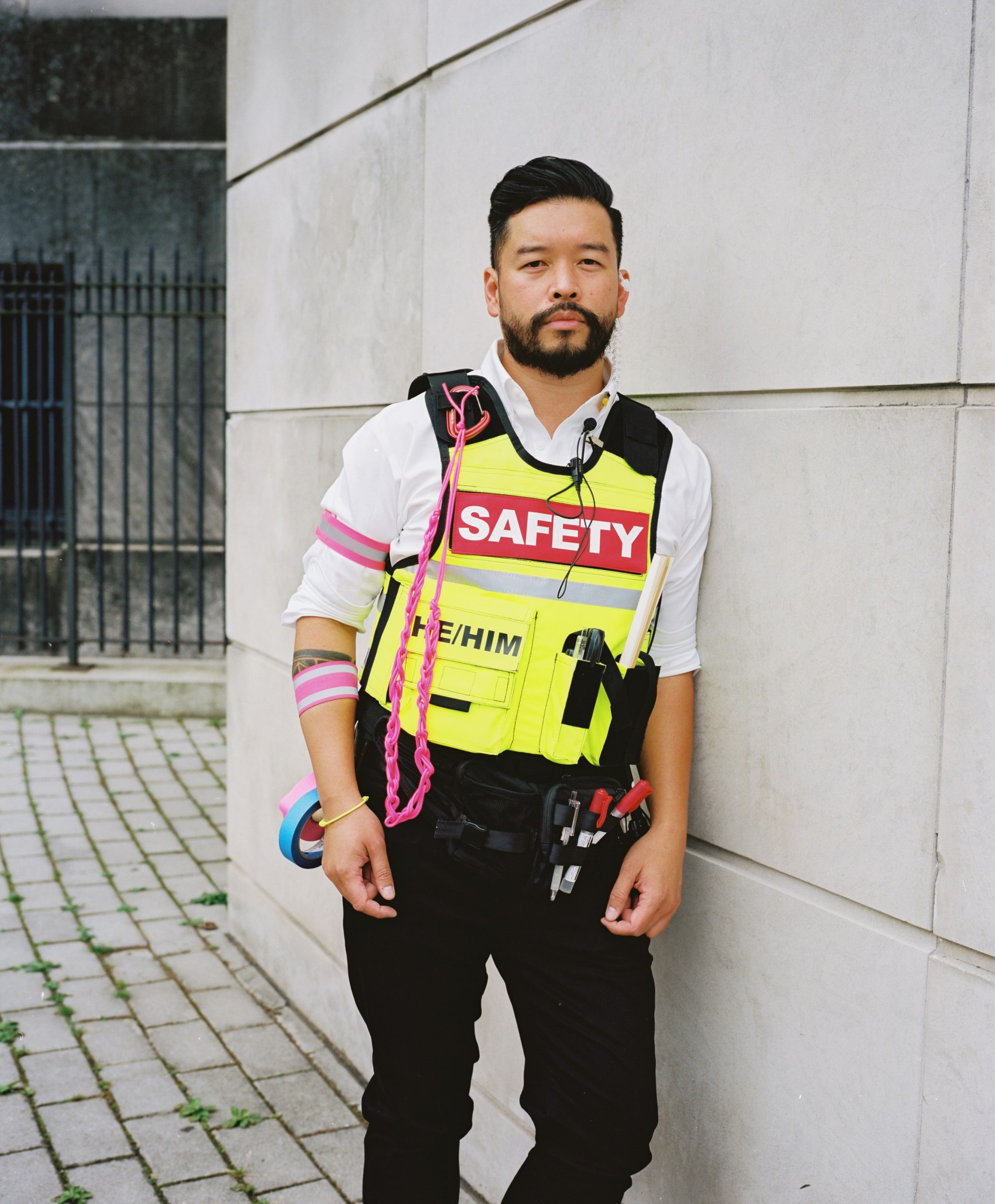
Kalaya’an Mendoza
Where did your journey in fighting for justice and liberation begin?
It started from the moment I was born, as a Filipino my Ancestors resisted and fought back against colonizers for centuries and I carry that lineage as a sacred trust.
In this social media age, where so much social justice dialogue is happening online, why is it important to show up in person in order to express acts of protest?
Building people power is central to direct action organizing. It can happen online AND in the streets. When we are engaged in Movement work it is integral that we not replicate Ableist approaches to doing the work and that means ensuring that everyone has a place and way to contribute to our collective safety and liberation.
What do you hope young Black trans folks and others directly impacted by anti-trans legislation will feel when they participate in or hear about this action?
I want them to know that they are seen, loved, cared for, and will be protected by community. I need them to know that they are sacred, divine and powerful beings who deserve joy and bliss. I pray that after witnessing this action that they know that there is so much radical love, community care and mutual protection being built by their leadership for them and for the next generation of Trans, Gender nonconforming and nonbinary youth.
What does liberation mean to you?
Liberation follows decolonization both the internal and external. When Black Indigenous PoC Trans Disabled Youth can say that they feel safe, cared for, loved, seen and venerated by all, that is first indicator that we are truly on the path to liberation. Liberation is the cessation of suffering and the conditions of suffering. When white supremacy, colonialism, patriarchy and all these structures crumble that is when we will see collective liberation blossom.
Is there anything else you might like to share, reflect on, hold space for, or uplift on this platform?
A new world is rising out of the ashes of the old. White supremacy is crumbling as we speak. As a new dawn rises, we must always have our collective liberation as our shared north star and follow the leadership of those at the margins.
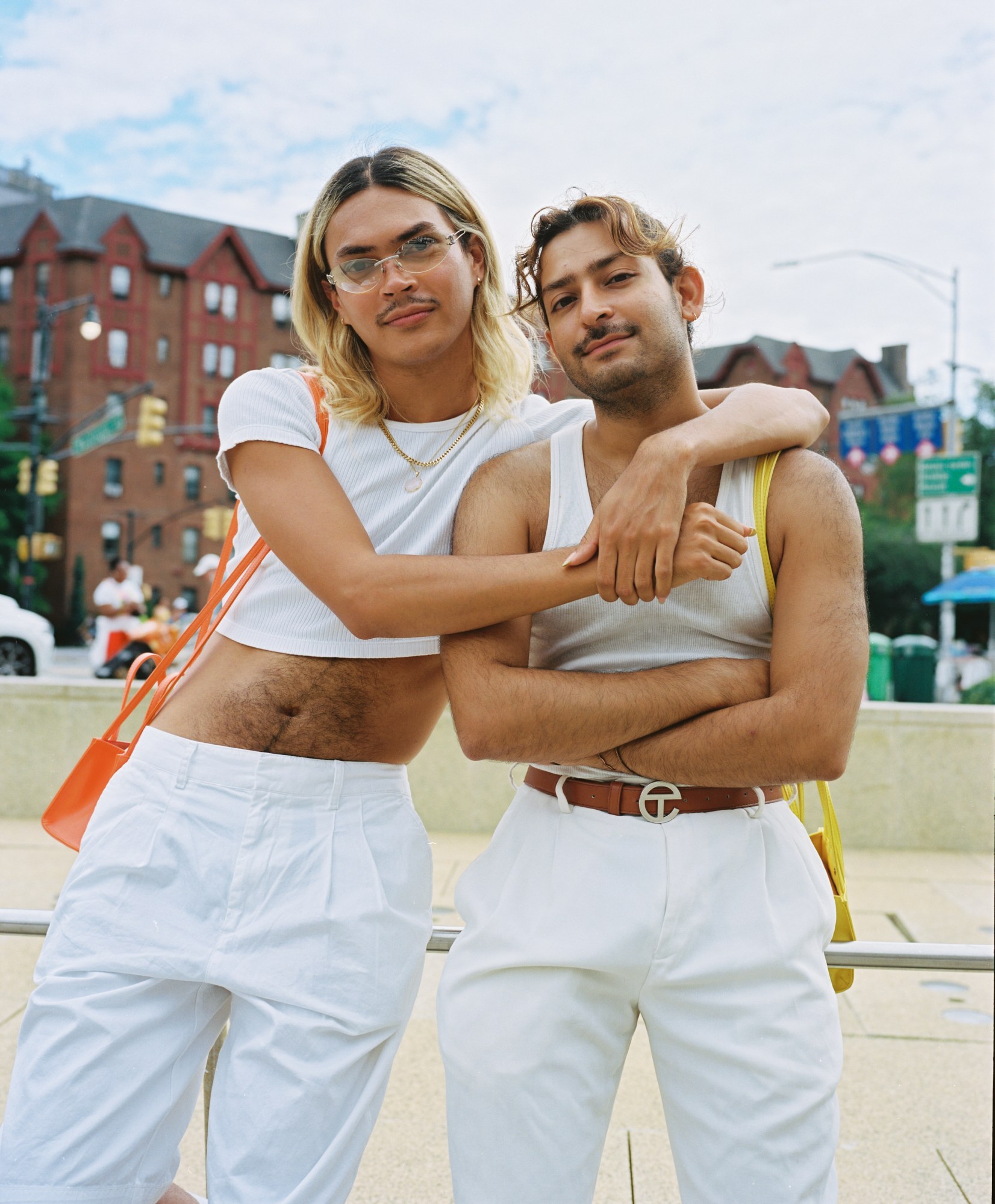
Mohammed Iman & West Dakota
Where did your journey in fighting for justice and liberation begin?
MI: My best friend in the sixth grade was a Palestinian-American girl named Reem. Her family lived up the block from ours in Queens, and my older brother Anam had become immersed in the fight for Palestinian liberation. It was right after 9/11, with enormous waves of Islamophobia sweeping the country, and being visibly Muslim was a scary and difficult thing. I was only 10 years old and the strength and perseverance of the Palestinian people taught me that resistance and the fight for justice was more important than the need to be liked or be polite. Those early lessons taught me about solidarity from an early age.
In this social media age, where so much social justice dialogue is happening online, why is it important to show up in person in order to express acts of protest?
MI: It’s important to recognize that not everyone can show up in person, whether they are disabled, or caretakers, or can’t get time off of work. Because of this, showing up IRL has no intrinsic higher value than showing up URL; the only way we’re going to get through any of the things smothering our communities is with steady, consistent resistance from every angle. If willing and able, showing up in person allows for a physical representation that feels stronger by sheer numbers alone. Showing up in person, as the existing body of people who live and breathe and work in these communities, is a powerful message to send to anyone even glancing in our direction. If you haven’t been paying attention, you ought to now.
What do you hope young Black trans folks and others directly impacted by anti-trans legislation will feel when they participate in or hear about this action?
MI:
This action, and all the others like it, should feel like a mirror. What we’ve been able to do is create a platform and space for young people to share their existing organizing, their existing voices, their existing ethos. We are but a backdrop for them to share and amplify their hard work and magic as they see fit.
WD: It’s important to recognize that even outside of legislation, young black trans folks and other trans folks are still subjected to difficulties, inequities, and injustices. I think back to last year, when Raquel Willis said that white trans folks get to worry about legislation, while Black trans folks have to worry about their lives. It’s important in this New York bubble to realize that legislation isn’t the only thing impacting young trans lives.
What does liberation mean to you?
MI: Inspired by the words of the late Terrell Davis, liberation to me is when we achieve freedom for all oppressed people.
Is there anything else you might like to share, reflect on, hold space for, or uplift on this platform?
MI: My organizers and I were youth not that long ago. This set of youth will grow into our age group soon, and a new generation will inhabit the space they are in now. The LGBTQ+ community lost easy access to the generation before ours with the HIV/AIDS epidemic, and we have the chance to renew these bonds up and down generations. We managed to open these doors for ourselves; how can we lean back and prop these doors open for everyone after us? How can we create structures that future generations can inherit from us? Can we help them enter their journeys with a headstart way beyond what we had? This is our legacy and feels like the next step of organizing for us.
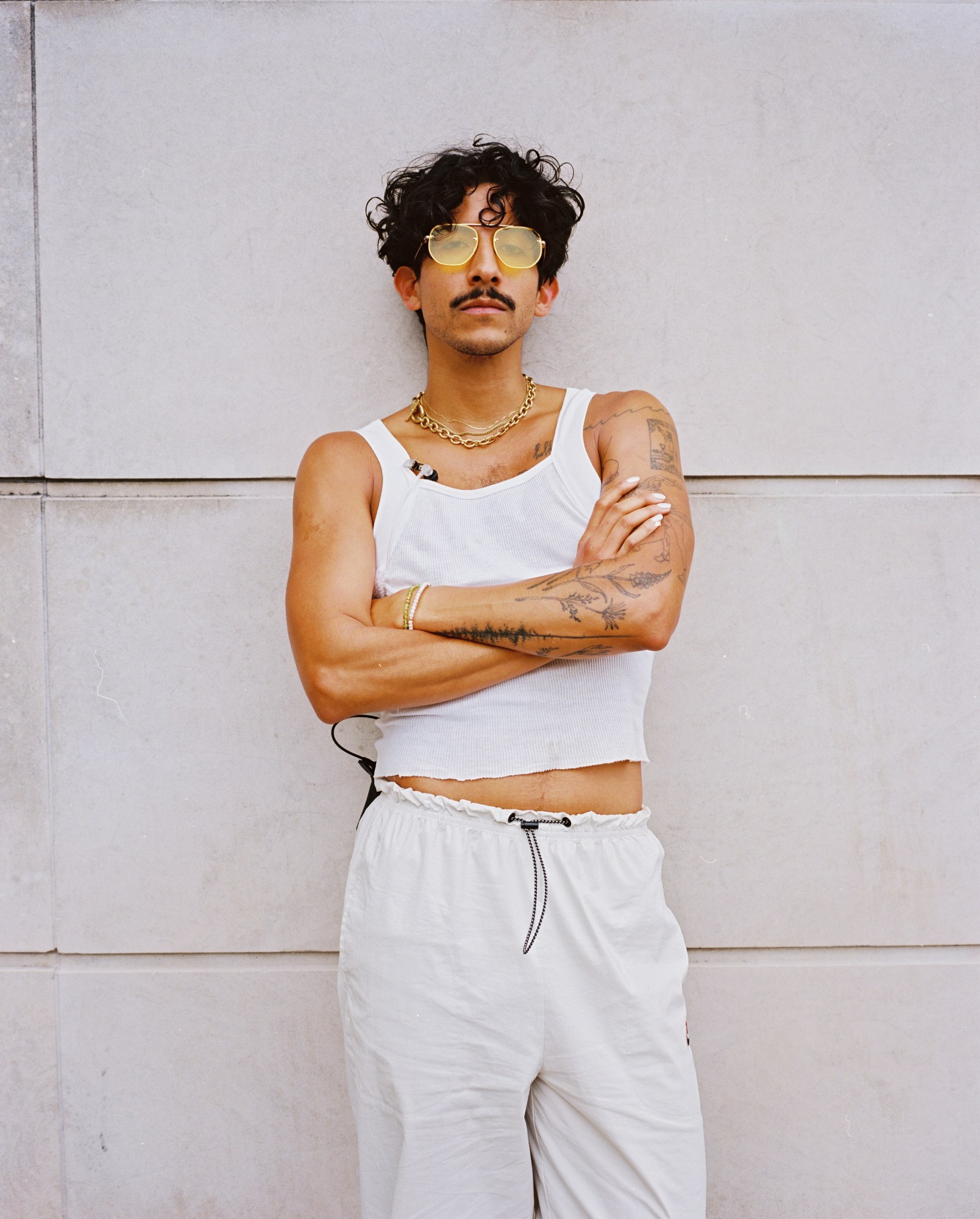
Fran Tirado
Why is it important to show up in person in order to express acts of protest?
Digital organizing is one of the most accessible ways to movement work, but sometimes it’s the bare minimum! In the age of “woke” activism, it’s too easy to share something to story, or put a hashtag in your bio, and call it a day. To those that are able, showing up in the streets builds solidarity and more equitable public power.
What does justice mean to you?
Something that can only be achieved by a community, not an individual.
Is there anything else you might like to share, reflect on, hold space for, or uplift on this platform?
Just that queerness is a superpower that connects you to a community and collective way of being. If you tap into that power, there’s nothing you can’t do!
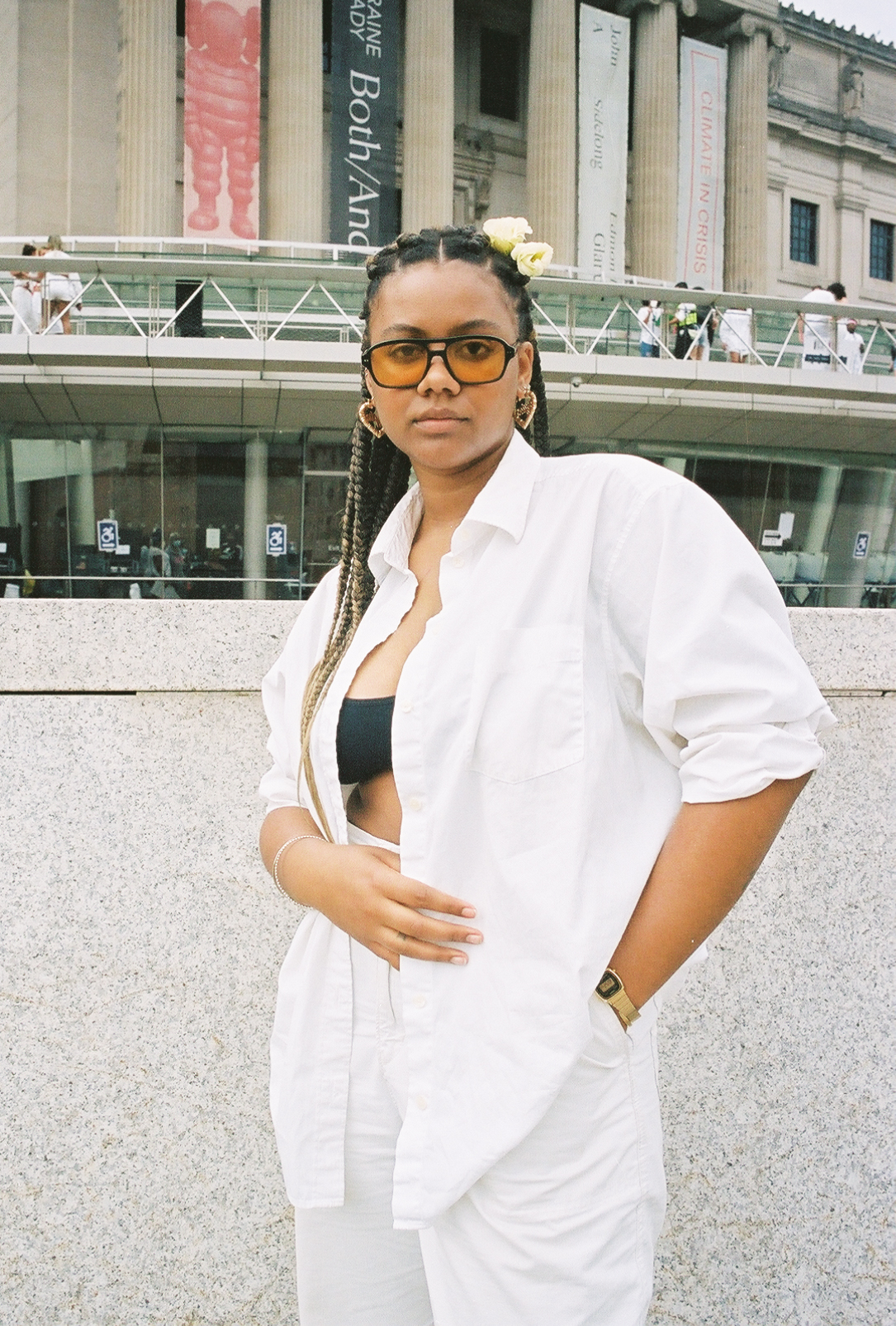
Peyton Dix
What does liberation mean to you?
When I think about liberation I think about Ebony Janice’s theory of Dreaming Yourself Free. The idea is that Black people should be able to shape our lives and labor “from a place of dreaming and not just from resistance.” We want life. We want liberty. We want justice.
Is there anything else you might like to share, reflect on, hold space for, or uplift on this platform?
I want to always remind myself and others that all of this work needs to be sustained until our trans brothers, sisters, and children are able to not just live but thrive. Keep showing up. Keep being loud. Keep listening.
